#which reminds me i have yet to post ernesto here
Explore tagged Tumblr posts
Text



Something something hi-diddle-dee-dee I drew this fox because fairy tales are an obsession for me :)
#this one blog made me appreciate the disney villains again#and after making my OWN version of the fox from “the adventures of pinocchio” i had to draw him i had to#which reminds me i have yet to post ernesto here#you can check my insta for it though: its whos_link#hes heavily inspired by honest john lmao#disney#honest john#j worthington foulfellow#pinocchio#pinocchio 1940#disneys Pinocchio#disney honest john#disney pinocchio#disney villains#disney fanart#my art i guess
16 notes
·
View notes
Text
Poetic Injustice: On Ateneo and Negotiating Complicity
To be a successful comprador is an art. Tony Tan Caktiong knows this. Given the scale at which multinational corporations influence Philippine culture, at this point, who are we to refute it? And how? Profit-seeking forces itself on us; to be recognized. Every mass-produced item of clothing featuring the pattern of an ever-smiling billion-dollar bee is indication enough: Art is execution. In fact, being the recipient of foreign capital requires deliberate hands able to maintain thousands upon thousands of labor-only contractual workers, despite their having worked at the same establishment for years on end. These workers produce what no middleman can. Yet a company will still view being bought-out by an industry giant as the ideal exit strategy. Each moving part makes for one striking image of monopoly– worthy, one might insist, of being featured in a gallery.
Jollibee Foods Corporations (JFC) acquires stakes or ownership of restaurant chains in order to expand, as it has done over the course of many years with local and foreign brands. Their current roster includes Greenwich, Chowking, Red Ribbon, Mang Inasal, Burger King PH, The Coffee Bean and Tea Leaf, and Panda Express PH. The company also runs businesses internationally, such as Smashburgers in the United States, and Yonghe Dawang or Yonghe King in China.[1] Of course, the face of this massive undertaking remains the once tiny Magnolia-inspired ice cream store, Jollibee, now every business-oriented insect’s wet dream.
Ernesto Tanmiantong, brother and successor of Tony Tan Caktiong as Chief Executive Officer (CEO) of Jollibee Foods Corporation, is the latest former Chairperson of the Ateneo de Manila University Board of Trustees.[2] One can even find his name, along with his wife’s, gracing a first-floor exhibit hall of the Ateneo Art Gallery, found inside the university’s so-called creative hub, the Arete. In the months before the start of the first semester of S.Y. 2018-2019, Tanmiantong’s adorable, marketing-committee-approved buddy in white gloves and a chef’s hat took a trip to the then-newly inaugurated art gallery for a photo-op. The mascot then posed with several installments and paintings, a couple of which depicted farmers and workers.
According to the Department of Labor and Employment (DOLE), JFC is one of the most notorious businesses with regards to the perpetuation of the practice of contractualization.[3] Contractual workers are, according to law, not employed by– and, therefore, not the responsibility of– the company they provide labor to. Because of this, these workers do not receive benefits or compensation, are often subject to abusive working conditions, and are vulnerable to the shameless practice of mass termination. No doubt, the Public Relations stunt with the Ateneo Art Gallery was ill-timed; right at the height of protests against the corporation, in the midst of its non-compliance with the DOLE’s order to regularize upwards of 6,000 of its workers– there was Jollibee: tone-deaf and taking pictures to post on his Facebook profile, The Atenean Way.
Ironically, as the statement by Ateneo’s School of Humanities Sanggunian (which condemned the incident) pointed out, perhaps even the person inside that oversized blinking head of the Jollibee mascot was a contractual worker, posing in a space that he might never have been able to enter without the cartoon-bee-mask of his exploitation.[4] Surely, it does not matter whether or not the institutional faux pas was an intentional case of art-washing. At least, it should not. Is there such a thing as art for art for art’s sake?
---
There is this poem entitled “The Doomed” written by Mikael De Lara Co. A friend of mine recommended it to me once after a workshop session because my piece, he said, reminded him of it. I do not think my friend meant to insult me. Unless he did.
“The Doomed” is a poem about writing a poem, wherein the poet-persona is aware that, while he is writing poems about lilies, there is violence somewhere, which he is both physically and socially detached from. This violence is manifest into the shooting of Liberal Party supporter and candidate, Hamira Agcong, in 2010, as well as the infamous Ampatuan Massacre that occurred in 2009, where 58 people were kidnapped and killed.
Where do poems fall under in the realm of social praxis (if at all)? “The Doomed” ends with the lines “I want to find beauty in suffering. / I want to fail.” Yet, the poem’s aestheticization of the murders via tone and imagery is blatant. The declarative rejection of an ideal like beauty or portraying beauty betrays the poet’s pretentiousness in what can only be his underlying conservativity. There is no attempt to avoid it. With lines like “You sit at your desk / to write a poem about lilies and a clip of 9mm’s / is emptied into the chest of a mother…” and “… a backhoe in Ampatuan crushes the spines of 57 / – I am trying to find another word for bodies”, it sounds as though these killings are more poetic material than actual, politically motivated deaths. Tell me, is the reader to blame for reading what is on the page? Mikael De Lara Co fails in failing, making the poem and its project a useless endeavor.
Despite the pointedly crafted grief into the persona’s voice, “The Doomed” does nothing to grieve the circumstances which brings about its dramatic situation. Why are people “doomed”, if not for the bureaucrat capitalists that viciously plot to stay in power? Could the poet not have addressed that, instead of weeping about his writing process? I do not believe that the poem would have failed that, at least, because all language inevitably fails in the face of social reality. That would be lazy, if it were not bullshit.
But I suppose that is why “The Doomed” fails, most of all: The poet believes it is fine to write speeches for a leader who allowed farmers and indigenous people to be harassed, as long as they could be tagged as members of the New People’s Army, the armed faction of the Communist Party of the Philippines. A text speaks, though the words are not on the page. So, the poet dooms.
Mikael De Lara Co has won many awards for his writing and translations, including the prestige-inducing Don Carlos Palanca Award for Literature. He graduated BS Environmental Science from Ateneo de Manila University, where he was once an editor of Heights, the school’s official literary publication. He has been published in many other magazines, literary journals, and the like, where his author’s notes proudly indicate all these accomplishments and more, such as having, himself, worked for the Liberal Party and once been a member of the former President Benigno Aquino III’s staff under the Presidential Communications Operations Office. Ergo, ghostwriter, alongside a number of other Ateneans who were also once part of Heights.
“Noynoy Aquino was a fascist” is a phrase that does not get said often enough. The Aquino administration, with its neoliberal policies the color of dehydrated piss, is credited with the starving thousands of farmers to death. Unsurprising, I suppose, for a family of landlords to inherit a disdain for the very hands that feed them. Corazon Cojuanco Aquino passed the Comprehensive Agrarian Reform Program (CARP) during her regime, and her son amended it with an extension and reforms (CARPer), making it even easier for land owners not to have to redistribute their lands at all.
For all its “Kayo ang boss ko” and “Daang Matuwid” pandering, the Aquino administration did not skimp on its counterinsurgency program, Oplan Bayanihan, which heavily drew from the U.S. Counterinsurgency Guide.[5] Here, it was farmers and Lumad, some of the most vulnerable sectors of Philippine society, that were tagged as rebels, terrorists, communists, etc., simply for knowing and standing for their rights, as the government failed to decimate actual armed revolutionaries in the countryside.
The massacre that took place under the Aquino administration occurred in Kidapawan, Cotabato on April 1, 2016. According to reports, among the group of 6,000 protesters that was mainly composed of farmers and activists, 116 were injured, 87 went missing, and 3 were killed.[6] Perhaps the lilies in “The Doomed” were a metaphor for De Lara Co’s beloved Noynoy.
---
Speaking of Ateneo: For an institution that makes yearly claims to combat historical revisionism and uphold the memory of the victims of human rights violations under the Martial Law era, this university loves to slurp on major Marcos ass. In 2014, President Fr. Jose Ramon Villarin, SJ drew flack for having rubbed elbows with the iron butterfly herself, Imelda Marcos, at an Ateneo scholars’ benefactors’ event.[7] The mere thought of Imelda posing as a charitable, bloated cockroach in a wig that feasts on all that is lavish and garish, while the university welcomes her to do so is nearly comical. I imagine the blood.
In 2019, a similar incident ensued[8], this time with Imelda’s daughter, Irene, whose art connoisseur lifestyle she lives second-hand. It was during the inauguration of the Arete’s amphitheater, named after Ignacio B. Jimenez, a crony of the corrupt family themselves.[9] Community backlash forced the building’s executive director, Yael Buencamino, to resign and for University President, Fr. Jose Ramon Villarin, SJ to issue a statement in response to the instance.
Yet, despite the triumph of Ateneans in demanding accountability for having the Marcoses at our literal and metaphorical dining table, there are also the Camposes, the Consunjis, the Lorenzos, and other local elite whose hands are stained with generational blood, that have established their presence in the campus with no near hopes of showing them out. Students could also be as loud as they pleased about the violations on workers’, farmers’, and national minorities’ rights that these families are frequently attached to, with only the answer of a warning that school organizations may lose sponsorship opportunities. What else can we expect? Of course, the names that line the halls that one studies in are the limits of academic freedom.
---
A few semesters ago, I wrote a poem to be workshopped by my co-English staffers in Heights as part of our membership retention requirements. It was not a good poem, I know. It was about my experience of integrating with the striking workers of Sumifru, a multinational Japanese company that produces fruit, whose union was called NAMASUFA (Nagkahiusang Mamumuo sa Suyapa Farm). After struggling to get word out of their plight and facing violent dispersals and harassment, 200 workers came all the way from Compostela Valley to Metro Manila via boat and plane, despite the difficulties of travel due to the imposition of Martial Law throughout Mindanao. Their objective was to pressure the DOLE and its Secretary, Silvestre Bello III, into action; that is, to be firm in enforcing Sumifru’s compliance to regularize their workers, which the company refused to do even though the DOLE had legally recognized them as their workers’ employer. The workers set up camp in various places, such as Mendiola, Liwasang Bonifacio, and beside the Commission on Human Rights inside the University of the Philippines Diliman campus, and often welcomed students who came to learn about their cause.
During the workshop, the discussion began with a silence and an awkward laugh. Political realism was how my poem was diagnosed, for obvious reasons. However, the main critique that I remember was that my use of language– the words multinational corporation and bureaucrat capitalists, in particular– did not induce the feeling of the struggle that the workers went through. It was not the language workers used or would use. I refuted this claim, saying I had talked to the workers. That this is exactly what they say. No, it is not poetic. It is real.
I agree, though, with the verdict that my poem was not good, if the basis were form. I agree because I do not think poems need to be good to say what is needed. If the basis were factors other than form, I still do not think the poem is good. I mean, either way, it does not change the fact that, ultimately, I only wrote a poem for a workshop, despite any intention of bringing awareness to NAMASUFA. Is a poem going to save them their jobs? Does that make a difference? Did it make a difference?
The Sumifru workers returned to Mindanao last July, 2019. I have left Heights as well.
---
Within the Ateneo campus, a tarpaulin overlooks the red brick road that the entire Loyola Schools population traverses. The sign merits a purposeful, impossible-to-miss position on the old Rizal Library building, immortalizing the critique: “We find the Ateneo today irrelevant to the Philippine situation because it can do no more than to service the power elite.” Nothing could be more fitting, in my opinion. The Ateneo de Manila University’s commitment to performativity deserves to be blasted in our faces, if at least once a day.
This declaration was taken from the “Down from the Hill” manifesto published by The Guidon in November of 1968. The manifesto was written by a group of five students, namely Jose Luis Alcuaz, Gerardo Esguerra, Emmanuel Lacaba, Leonardo Montemayor and Alfredo Salanga, all of whom actively campaigned for an anti-imperialist orientation to nationalism.
I want to talk about Eman Lacaba. Throughout the Marcos regime, he was a student activist– a radical, so to speak, as disapproving administrative bodies might now label him. Presently, he is known for being a poet, revolutionary, guerilla, and a martyr during the Martial Law era. One of his most often discussed poems is “An Open Letter to Filipino Artists”, a piece that finds itself into syllabi like a de-fanged snake. The poem is a detailing of his experience as a cadre of the New People’s Army; the provinces he visits, his process of proletarianizing from a burgis boy to a communist rebel, and so forth. The epigraph of the work, a quote from Ho Chi Minh, affirms his praxis– “A poet must learn how to lead an attack.” The poem is the revolution that Lacaba takes up arms for. I guess now that he is dead, Ateneans can wholeheartedly claim him as one of their own.
After the Martial Law era, Ateneo decided to create a body dedicated to the integration of its students with various disenfranchised sectors of society, as encouragement for their middle to upper-middle class youth to become more socially aware and active. The Office of Social Concern and Involvement (OSCI) is the current iteration of this. Their programs, from first year to fourth, require students to be socially involved enough to pass their Theology units. Commendable, no? Still. You can almost get sanctioned for so much as lighting candles for state-murdered farmers on the sidewalk by the gates outside of campus if it is not an Office of Student Activities-approved event– something I learned the hard way. I was not aware that bureaucracy was a key principle in Catholic Social Teaching.
So, does this mean the opposite of active non-violence is that which is inactively violent? The areas that OSCI allows their students to immerse in are carefully chosen, the interactions are prepared for in advance. In fact, they do not want to use the term “immerse” lest they be misconstrued with the damn leftists that climb mountains and “brainwash” unsuspecting poor people. You know, the ones that dare challenge the status-quo? Ateneo, or at the very least, its administration, will recognize the necessity of political action, but only to a certain extent. Nothing like Eman, the warrior-poet, whose militance is much too red to aestheticize.
The contradiction between what is said (marketed, poeticized, apologized for, etc.) and what is done should be scrutinized, instead of convincing ourselves that our interests are not merely our own. The dominant culture of a society will expose who supports those who hold political and economic power.
[1] Cigaral (List: Brands operated by Jollibee Foods Corp.)
[2] (Leadership)
[3] Patinio (Jollibee tops list of firms engaged in labor-only contracting: DOLE)
[4] SOH Sanggunian (The Statement of the SOH Sanggunian on Jollibee's PR Stunt)
[5] Karapatan (OPLAN BAYANIHAN For Beginners)
[6] Caparas (WITH VIDEOS: 3 dead, 87 missing, 116 hurt as police fire on Cotabato human barricade)
[7] Francisco (Ateneo de Manila 'sorry' over Imelda's visit)
[8] Paris (Irene Marcos was invited to Ateneo, and students are up in arms)
[9] Rappler.com (Ateneo hit for art ampitheater named after Marcos 'dummy')
Works Cited
Caparas, Jeff. “WITH VIDEOS: 3 Dead, 87 Missing, 116 Hurt as Police Fire on Cotabato Human Barricade.” InterAksyon.com, 1 Apr. 2016, web.archive.org/web/20160402013745/interaksyon.com/article/125901/breaking--security-forces-open-fire-on-cotabato-human-barricade.
Cigaral, Ian Nicolas. “List: Brands Operated by Jollibee Foods Corp.” Philstar.com, The Philippine Star, 24 July 2019, www.philstar.com/business/2019/07/24/1937490/list-brands-operated-jollibee-foods-corp.
Francisco, Katerina. “Ateneo De Manila 'Sorry' over Imelda's Visit.” Rappler, 6 July 2014, www.rappler.com/nation/62549-ateneo-manila-imelda-marcos-apology.
Karapatan (Alliance for the Advancement of People’s Rights). OPLAN BAYANIHAN For Beginners, Karapatan, 2011.
“Leadership.” Leadership | Ateneo Global, global.ateneo.edu/about/leadership.
Paris, Janella. “Irene Marcos Was Invited to Ateneo, and Students Are up in Arms.” Rappler, 8 Apr. 2019, www.rappler.com/nation/227702-irene-marcos-invited-to-ateneo-students-protest-april-2019.
Patinio, Ferdinand. “Jollibee Tops List of Firms Engaged in Labor-Only Contracting: DOLE.” Philippine News Agency RSS, Philippine News Agency, 28 May 2018, www.pna.gov.ph/articles/1036679.
Rappler.com. “Ateneo Hit for Art Ampitheater Named after Marcos 'Dummy'.” Rappler, 21 Apr. 2019, www.rappler.com/nation/228633-ateneo-ignacio-gimenez-ampitheater-marcos-dummy.
“SOH Sanggunian.” SOH Sanggunian - The Statement of the SOH Sanggunian on..., 2 July 2018, www.facebook.com/sohsanggu/photos/a.157891440898864/1893103380710986/?type=3.
10 notes
·
View notes
Text
Lucifer 5x03 - ¡Diablo! - Spoilers & Speculation
Warning! There is always a possibility that certain scenes might have been mixed up under their non-respective episodes.

Written By: Mike Kosta
Directed By: Claudia Yarm
Mike Costa has written/co-written the episodes:
1x10 - Pops
2x09 - Homewrecker
2x15 - Deceptive Little Parasite
3x07/2x21 - Off the Record
3x13 - Til Death Do Us Part
4x05 - Expire Erect
5x03 - ¡Diablo!
Cast: Tom Ellis as Lucifer, Lauren German as Chloe, DB Woodside as Amenadiel, Lesley-Ann Brandt as Maze, Kevin Alejandro as Dan, Scarlett Estevez as Trixie, Rachael Harris as Linda Martin and Aimee Garcia as Ella.
Season 4 Recurring Characters: None Officially Announced Guest Cast:
Dan Andreiu...Skeezy Motel Tenant
Jacob Chattman...Detective Doofus
Ernesto Chaverri...Police officer
Brianne Davis...Detective Dancer
Genevieve Gauss...Officer Cacuzza
Alex Quijano...Diablo
Behind The Scenes Videos:
youtube

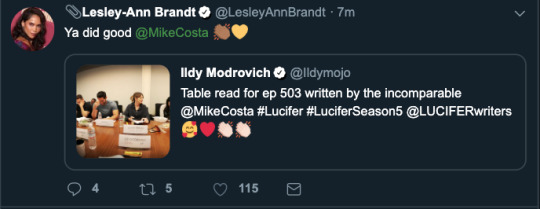




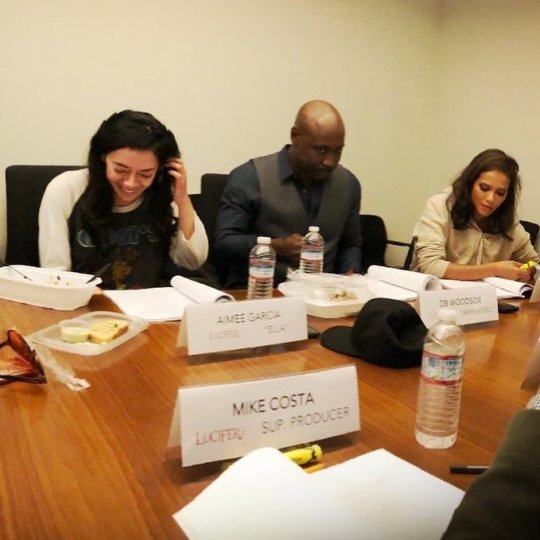
Locations
Chloe’s Apartment - Maze & Trixie (There is all a Trixe-Lucifer scene)
Precinct - Dan, Lucifer and Ella. -Before the bracelets-
Pink Motel - Not a murder scene but I believe they question the owner as he is listed in the cast.
Warner Brothers Stars Hallow Set Area - Open Stages:
1) The Murder Scene - Dan, Ella, Lucifer & Chloe
2) Stage III - The room with the clowns. Prior to Halloween WB had built a clown maze for tourists and its workers although they didn’t the usual annual Halloween attraction but it was not the same one. However, I believe it may have been used for this episode nonetheless.
3) Stage Set - Hell set used as a Tv Series Prop although it acts as our actual Hell as well.
When an episode is shot at the lot it means it costs less money to be made still what it saved them on money it cost them on 1-2 days.
This episode is called from us “Diablo: The Tv Series Episode” and we call it that because that’s what it is. There is no AU here but something like 3x02 where you see our leads investigating a case which is related to a show. Now that show is VERY similar to Lucifer. Extremely so but we will talk about that in a bit.
First of all the main themes of this episode is Lucifer’s ongoing instability but also a problem that seems to tie him eventually to Dan. Dan’s issue in my opinion started either in the first episode but is gradually getting worse so in 5x03 Lucifer provides a temporary solution. But is that him or Amenadiel? As we know Chloe and Amenadiel work together for a bit in this episode.

As always in order to unravel this episode we will rely on the case of the week. Where does the murder takes place? At the WB lot actually, so be prepared to see it again like you did back in 3x26 yet that is a different area.
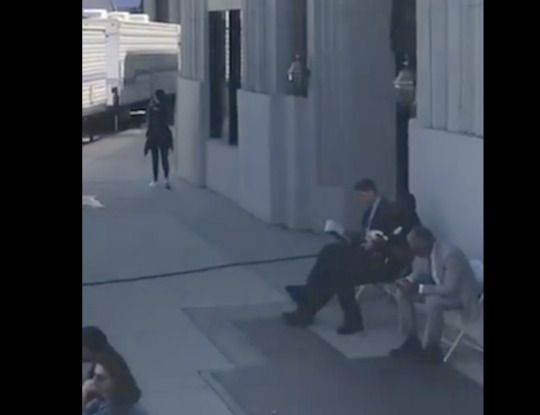
^Aimee on the left


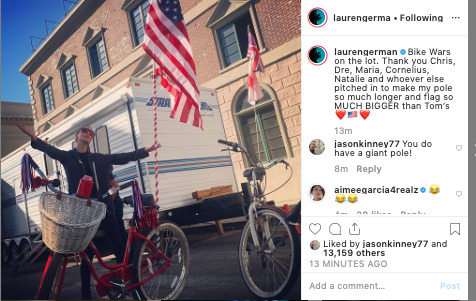

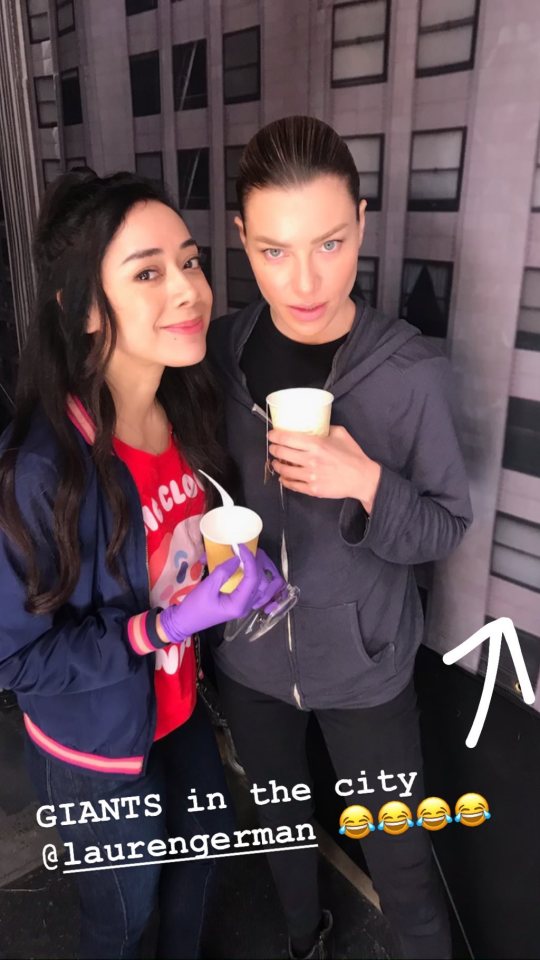




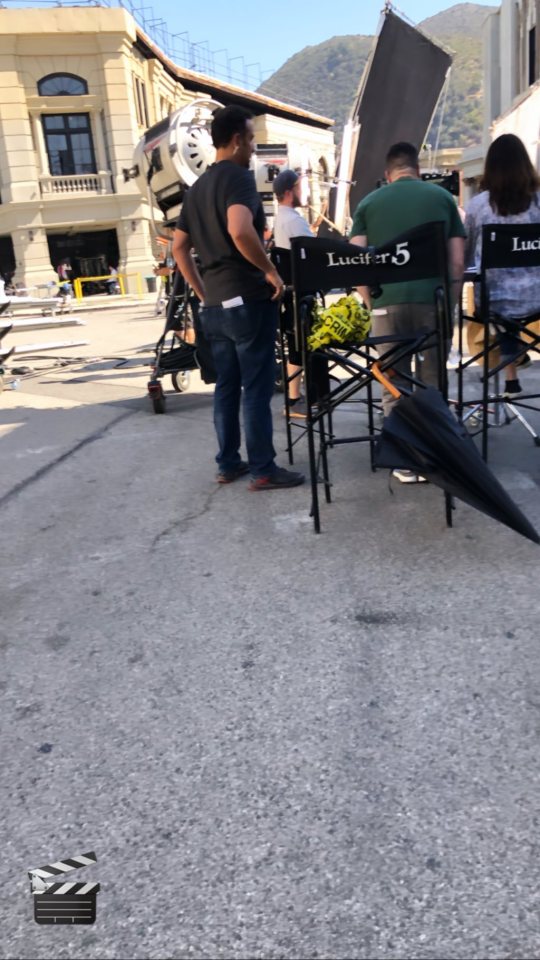
They also shot at night at Stars Hallow Set.
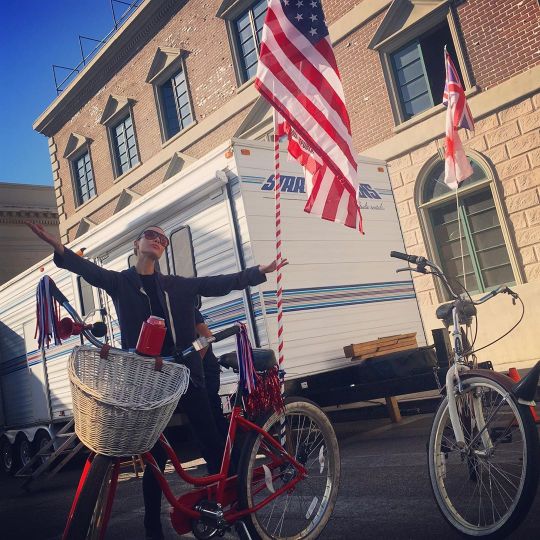
We have some photos from Josh with Aimee and Kevin where you can clearly see that Dan does not wear the bracelet yet. Same goes with Lucifer’s bracelet at the beginning of the episode neither of them wears it and that makes sense.
Let’s talk now about the victim and the theme of the episode again. For some reason the murder is connected to a television show called ‘Diablo’. We know that because there are several hints and downright spoilers about that like the social media posts of some people which will not be posted for obvious reasons.
Diablo as a show has EVERYTHING Lucifer’s life has. Scratch that everything Lucifer as a show had in its first season down right to the… same poster. Yep!
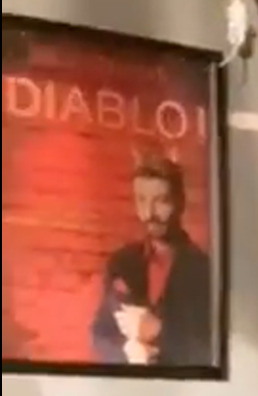
So when I say everything what do I mean? I mean that there are the following characters who take the place of our main leads:
Lucifer = Diablo
Chloe Dacker = Detective Dancer
Maze = Blaze (male)
Dan Espinoza aka Det. Douche = Det. Dooffus
We do not know who else is featured but I would expect Linda, perhaps Trixie and Amenadiel to have their own counterparts.

^ Dancer was originally Chloe’s surname in the Kapinos Pilot do not be surprised is you see Linda being played by a Kim...
Yet who would do that? Who would make a Tv Show that resembles so much Lucifer’s life? My first thought was Ella but then I found a BTS about an Alex Lopez and I assumed he was one of her brothers taking advantage of her workalike stories. Although that may be true then how could anyone know how the actual Hell looks like?
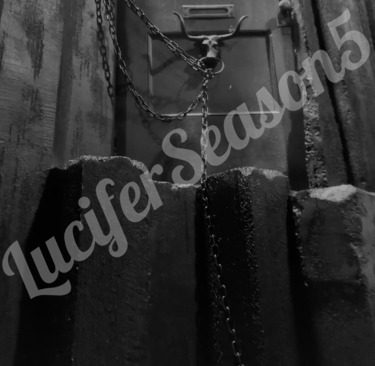
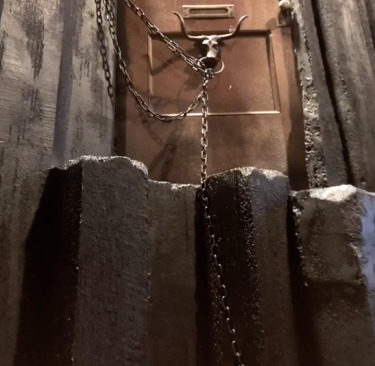
One day I got a glimpse of a woman which I think was Inbar on set. Additionally, at that time, Inbar Lavi posted a few S4 photos which seemed a bit peculiar. Therefore if Inbar was on set and is the person who made the tv series Diablo we are in for a hoot!
If that happens it means that Eve has found her way and she might eventually find her way back to Maze’s life in P2. Of course, that’s a speculation but we can always hope!
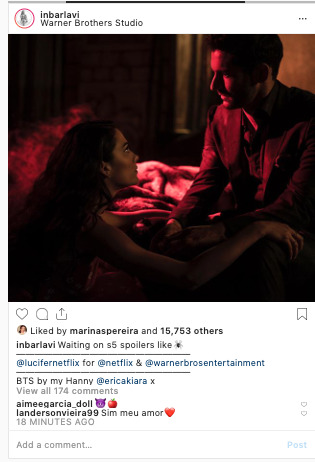
The next question is why would our writers do that to Lucifer? Why would they put him through an experience that shows him his work and partnership so obviously to him through a series like Diablo? As we know Lucifer is a bit thick sometimes so for all the characters it would be nice to acknowledge certain dynamics as seen from a show that is, of course, a caricature of the actual actors.
I mean Diablo has frozen tips, Det. Doofus looks downright clueless and Blaze… Blaze is the equivalent of Maze but big… Congrats Eve! If that was you, of course, you made Maze looking butch!
So in that episode, Lucifer needs to come face to face with the facade of his life in Hell but also on Earth and I believe it’s time for him for another breakthrough. The same goes for the rest of the leads.
I stand by the opinion I posted on Twitter that 5x03 as far as I see it is a wake-up call that no matter for how long you keep a costume & a mask on that's not who you are. It's also a point where Lucifer's work & partnership may finally be unveiled for what they truly are. All that while they search for a solution. Yet for what solution do I talk about?
Something is wrong with Dan perhaps even Lucifer but I do believe the origin of the problem is Dan due to Lucifer’s actions back in 5x01. If I had to guess I would say that they need a way to make sure Dan is kept alive that a life source is sustained and that requires a link which I suppose is the bracelet. But that it’s just a temporary solution, the permanent one will come in 5x08 and will have its own consequences!
In any case we do have Lucifer and Chloe going to the Pink Motel for some questioning but then… then it seems like Lucifer disappears for a bit. If my speculation is correct during his recovery the events of 5x04 will happen but that will be explored in the next S&S!


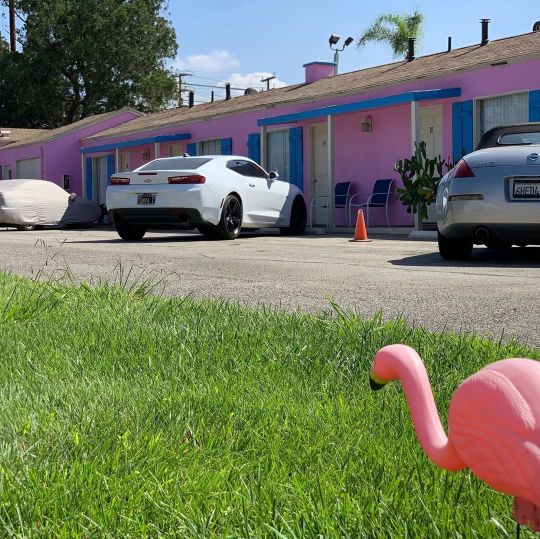
The Pink Hotel is considered a landmark btw.



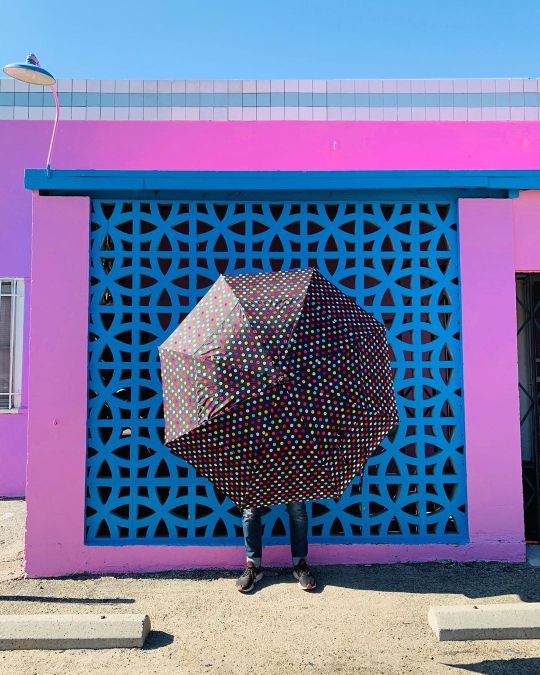


Let’s say now that half of the episode is almost gone perhaps less, 15 min? And we have Lucifer out of commission or perhaps they search with Dan for what they need. That leads to two different groups working and I do not mean that it will be necessary on the case.



^LUX as Hell it even has poles...
*cough* priest collard male strippers*
On one hand, you have Lucifer and Dan. When Kelly Clarkson visited the penthouse aside from several cool parts of that episode like LUX that is now called HELL in the Diablo series we also had a glimpse of a book…
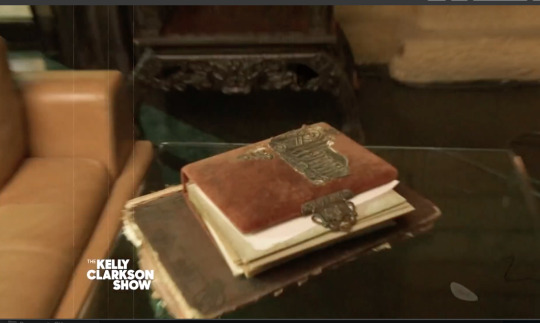
A book? Again? You may lament like Mum at the end of 2x17. Well yes, a book… an ancient book which it may or may not be related to this episode although I will speculate that it is. For me, that book reminded me the Book of Destiny…

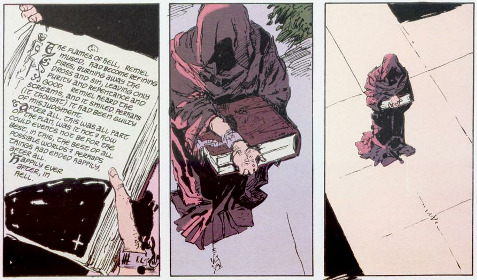
In order to understand what that means I have put some strips from the comics here for you. Lucifer and that book or to put it right Destiny, one of the Endless have had a disagreement about that book before but it didn’t work out that well…
The Book of Destiny as Sandman’s and Lucifer’s comics inform us:
“It contains your life. Every detail of your life. Everything that has happened to you. Everything that will happen one day. The things you have forgotten (ALERT on that one). The things you do not believe.”
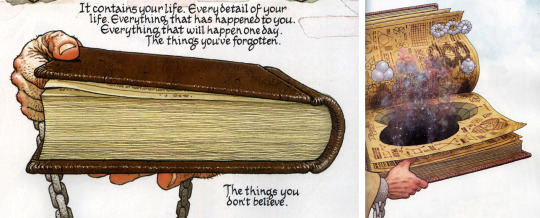

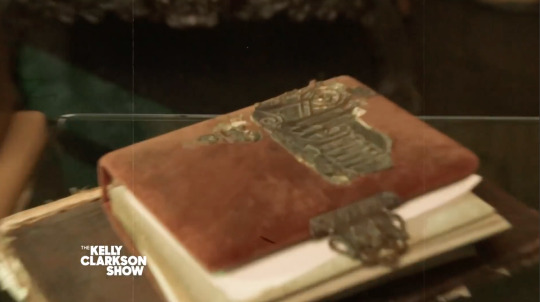
Yet the writers have never used a source from the comics without altering it so beware of that. It may be something that is based on that book or carries certain attributes of it.
So let’s assume that that book helps them create the bracelets and thus Dan remains alive for the time being. Also, does that mean that Dan will be exposed to the Devilish truth? If this speculation is correct I do not see how he can avoid it. At the same time learning all about Mom and most importantly Charlotte will do him A LOT of good. Yes, he has been healing in his own terms but whoever has lost someone knows that the pain never goes away it always nags you so I think it will make that pain a bit duller.

^Do not forget that Dan’s office area is full of motivation quotes... Do not be surprised if he is in therapy again in s5...

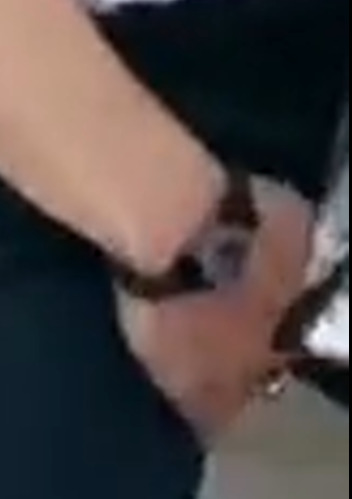
While Lucifer and Dan are preoccupied we have Chloe and Amenadiel working together I believe somewhat on the case or trying to help Dan. Who knows it might even be Eve - again IF she appears in that episode - who will give the temporary solution they need.
What intrigues me in DB’s photo from that episode is the official one that was released at ET where he is in front of a clown. It looks like a weird scary place, a theme park perhaps or even a set…
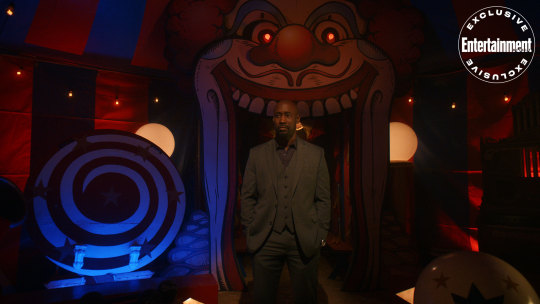
We do know that there were two crews and that scenes of the Diablo episode were requiring two crews, I mean would you let an actor near your 40K camera? Nope!
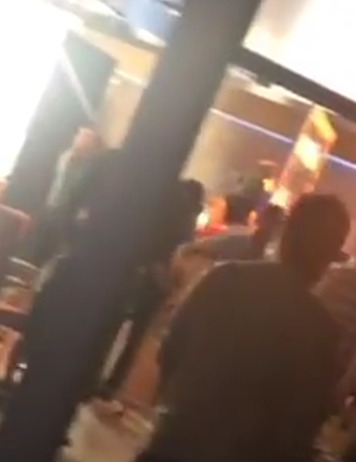
So the circus/clown scene is what interests me most as I have no idea what is going on there… What I do know is that it corresponds with Ella’s shirt. Ella’s shirt has a clown on and it says ‘Big Clown’ and something other underneath yet on the murder scene she wears a light blue shirt.
Additional Info
We have a Scene at the Penthouse which may be connected with the scene of Maze and Trixie at the Decker Household. However! Scarlett almost always shoots more than one episode so it is possible that it might be connected to 5x04. Still we take it as if it is for 5x03.
There is a fight scene with Maze and Lucifer against some people. Still, Ellis’ stuntman also filled in for a different role this time so that might have been for the Diablo show.
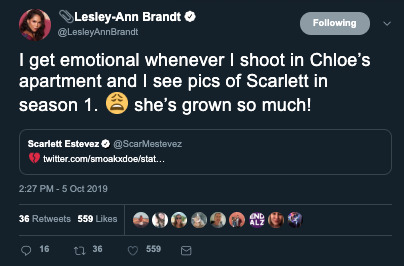

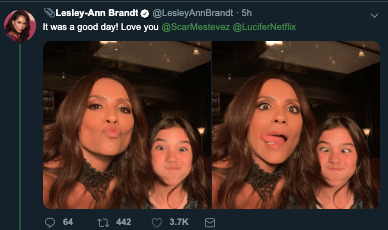





Finally, we did have Linda on set and there was a photo from within her house. Scenes from Linda’s house or her office during her sessions with Lucifer are rare so most of the time we do not know they are happening.

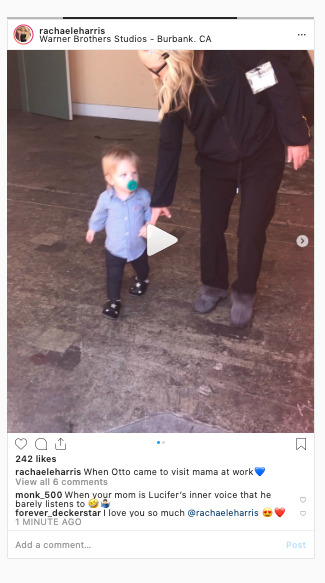
A background extra who played a police officer in this episode made it to an actor with lines. Of course now we know that she will have that role up to 5x08 yet we do not know if she will survive the serial killer ordeal of the last two episodes of S5 Part 1…

Additional bts of that episode including the Kelly Clarkson photos etc.

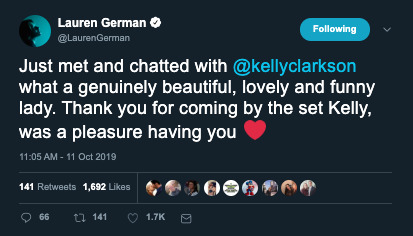
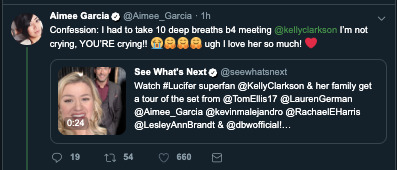



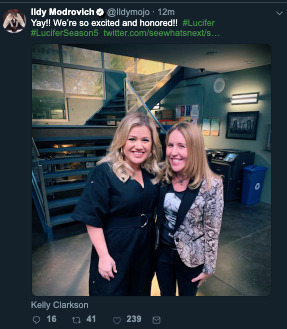

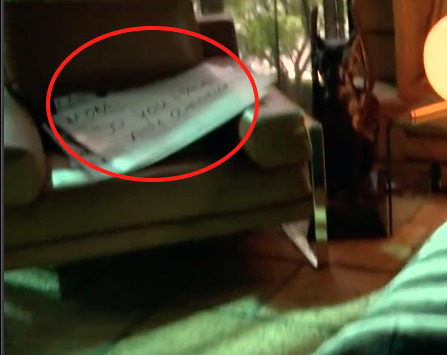
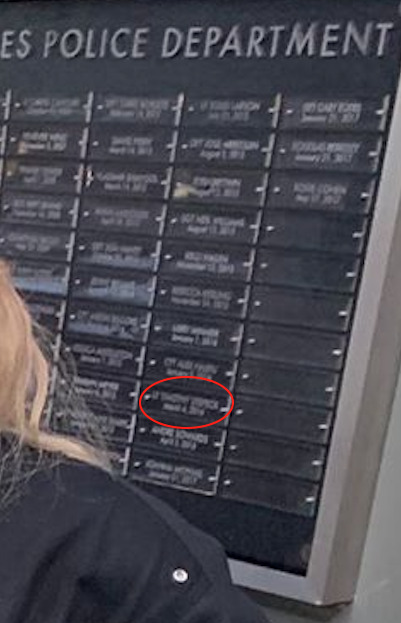
^Did you see Marcus’ honourary tablet?

^And of course the mermaid is back at her rightful place. It was there also in S4 but appeared only at a bts with Inbar. :)


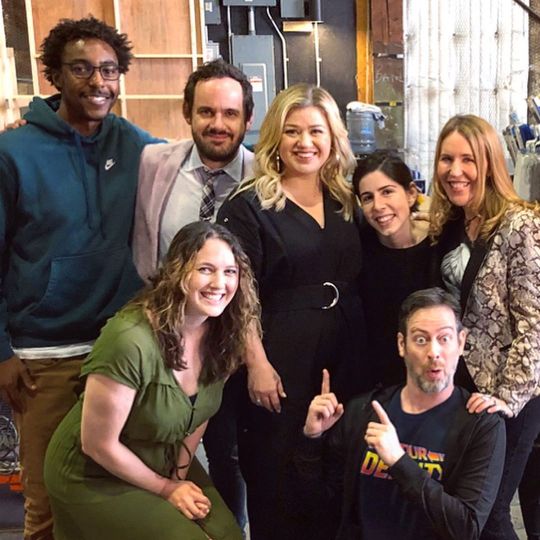






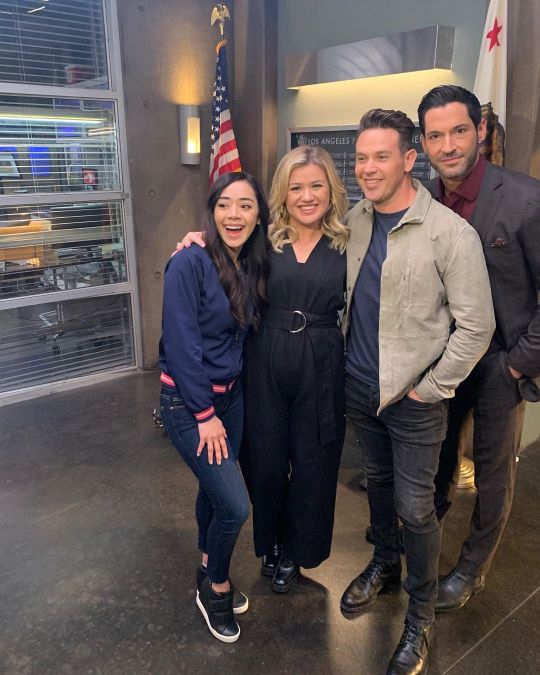
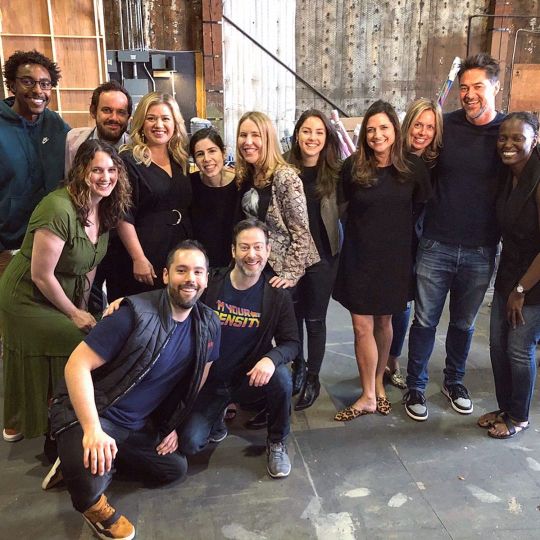

#lucifer spoilers#lucifer speculation#Sanoiro S&S#lucifer 5x03#Lucifer 5x03 ¡Diablo!#Lucifer Season 5#Lucifer Season 5 Part 1
55 notes
·
View notes
Photo

Next entry for @badthingshappenbingo!
Reminder that I am still accepting prompts for this! Check out my initial post for the guidelines. Also note the current bingo card on this post–the things I mark with crossbones are completed prompts, and ones with a single bone are ones that have been requested, but not written yet.
(Fics are also posted to AO3 and FFN, but please just use the links in my blog desc to get to those ‘cuz I’m too tired to make links for them.)
Aaand here’s our next prompt, submitted by an anon over on AO3. I didn’t want to take anon requests for this one, but I made an exception for this particular request.
WARNING!! THIS CHAPTER IS BRUTAL. Like, way way way way WAY more brutal than any of the others. It’s also technically a “bonus chapter” for my longfic, Neither Can You. It takes place directly after chapter 3, so you may want to skim that to get an idea of what’s going on here.
That said... here we go. Sorry in advance.
Prompt: Cold-Blooded Torture Characters: Héctor, Ernesto
The room was dark, and that was the least alarming thing about it. The meager light from outside shone through a dusty window and the open door, and that was enough to make Ernesto's shimmering white bones stand starkly out from the darkness. While his focus was trained on the man, Héctor was vaguely aware of the other crates and boxes that littered the room—some long-forgotten apartment that had been haphazardly converted into a storage unit, then forgotten again…
I have to get out of here.
That was the only coherent thought running through Héctor’s head—the only thought that was managing to push its way past the intense agony in his right hand. Said right hand, he knew, was currently in various pieces in a metal box sitting somewhere in the dark room. Somewhere behind Ernesto’s two bodyguards that were looming over him—they hadn’t moved yet, and he wasn’t sure when they would. He was too scared to find out.
Need to get out of here, maybe with the hand, maybe not, need to get out.
He did, he knew he did, but he wasn’t sure he could manage it. Part of him felt like if he tried to move, he would only make the pain worse, and he was so tired, he could just lose consciousness to get away from the pain—
Don’t fall asleep, don’t, it’s not safe, not safe, wake up, get up.
Biting his lip, Héctor pulled up his legs, digging his heels into the floor and pushing himself back. He pulled his arms back to press his palms into the floorboards so he could push himself upright—
His missing bones responded to the subconscious command, clattering against the metal box they were held in, and Héctor shrieked, falling hard against the floor.
“Don’t hurt yourself, hermanito,” growled a voice from the other side of the room, and Héctor clenched his jaw in anger. “After all, we’re not done here.”
“What?” Suddenly feeling much more awake, he looked back at the two men standing over him. In the dim light from the window on the other side of the room, he could see metal objects glinting in their hands. He still couldn’t tell what they were, and he wasn’t really keen on finding out.
“Ernesto, th-this is crazy,” he stammered, focusing on moving his left arm while keeping his right arm still. He managed to push himself upright this time, and fought to get back on his feet, only to fall at the sudden pain in his left leg—he must’ve injured it again in the struggle earlier.
“If you want to stop now, Héctor,” Ernesto began, and Héctor could barely make out the shine of his unnaturally white bones gleaming somewhere behind the bodyguards, “I can still call for your daughter to take your place instead.”
Héctor’s chest filled with ice. “Y-you can’t,” he choked. “You already called off—”
“I can get her back.”
“You’re bluffing!” he snarled, even as he felt his bones begin to tremble.
“Am I?” Ernesto tapped his phalanges against the metal box and exchanged glances with one of the guards, who pulled a radio out of his coat. “I suppose if you’re willing to make that gamble—”
“No, no!” His every instinct was screaming at him to run anyway, to take the risk that Ernesto might not be bluffing, but something far greater than that was telling him to stay, that he couldn’t risk her, he couldn’t risk something happening to the one person he’d been fighting for years and years and years just to have a chance of seeing her again. Whatever was going to happen would just have to happen; if her safety was at risk, then there was no alternative.
“So are you willing to stay with us for a little longer, old friend?”
Héctor’s eyes flicked to the guards, then back to Ernesto. “I-if I do,” he said, fighting against the heavy weight of dread in his chest, “will you leave her alone?”
“Of course.” Ernesto smiled. “So long as you’re cooperative, there’s no need to get her involved.”
Héctor tried to study his former friend’s face in the dark, and was struck with a new horror—he had no idea if Ernesto was telling the truth. For all he knew, he could have his guards attack him, and then still go after… Shuddering, he looked away, trying to think it through. If Ernesto was lying, what could he do? If he could get away, maybe he could try to make it to Coco before whatever sick person Ernesto had hired got to her, but he had no idea where Coco’s scheduled shoe delivery had been. He knew that she was going by herself, and he’d never thought to ask for the address. If luck was on his side, maybe the address was close by, but he had no way of knowing.
The Land of the Dead was vast, and for all he knew, Coco could be on the opposite side of it.
Terrified tears sprang to his eyes as he faced Ernesto again. “Promise me you won’t hurt her.”
“If you stay, then, yes, I promise no harm will come to her.”
Please, please don’t be lying, he thought, and shut his eyes. “S-sí. I’ll stay.”
“I thought so.”
Everything went quiet, other than the quiet shifting of the guards where they stood, the occasional creak of the old building, and the trembling of Héctor’s bones. After a short eternity, one quiet noise sounded above the others:
Knuckles rapping against wood.
The floorboards creaked as one of the two bodyguards stepped forward, and Héctor finally opened his eyes. Before he could respond, one of them moved to his side, grasping his shoulders, shoving him down into the floor, and holding him there. Automatically Héctor tried to push the man away, but again his broken hand tried to respond to the action, and he cried out in pain.
Part of him expected some smart remark from Ernesto, but when he looked back at where the man had been standing, he instead found Ernesto farther away, his back to him. But before he could think on that any further, he saw the other bodyguard slip into the side room, and quickly return with an electric lantern, which he set atop a nearby crate and switched on.
Héctor blinked and squinted in the sudden brightness, his breathing picking up as his vision took a moment to adjust. Dust floated in the flickering, humming light, and the frame of the man cast a looming shadow over Héctor. Of course those stupid guards with their stupid sunglasses hadn’t been bothered by the light.
The man who had retrieved the lantern knelt next to him, and Héctor felt the guard’s hand against his middle, pinning his spine the the floor. To his confusion, the guard proceeded to tug at either side of Héctor’s vest, exposing more of his rib cage. He then brandished the object he’d been holding earlier:
A hammer.
A flurry of panic overcame him as his chest began to heave in short, sharp breaths. “No, no, no no no—!”
In one swift movement the hammer came down, connecting with two of Héctor’s ribs. In spite of the pain, he couldn’t yell—the blow had winded him, leaving him to give out only a choked, hollow gasp. Again he tried to push away, managing to keep his bad arm still while his good arm flailed, striking at the man as much as he was able and trying feebly to grab the hammer away. In response, the man that was behind him shifted his grip from his shoulders to his upper arms, making it impossible for him to reach out. Even so he pounded his fist on the floorboards, kicking his feet and digging his heels into the hardwood.
His rib cage heaved, and he felt the pain of two bruised ribs on the right side of his chest. It could be worse, he tried to think, knowing full well it didn’t matter. But he had broken his ribs before—the one was still broken, the other missing—and he knew what they felt like. He’d gone through broken ribs before—he could handle bruised ribs. He could. He had to. He would heal, it wasn’t really that painful compared to—
Clang.
The hammer struck at a higher rib on his left side, and he felt the crack—it wasn’t all the way through, it wasn’t broken, it was just cracked, it hurt but it was just cracked, it would heal, it would heal, dios, why was this happening…
Against his will, his mind supplied an answer in the flash of a vivid mental image: Coco held down by a man as another approached her with a hammer—
With sudden sob, Héctor shook his head against the image. Please, please, no, you can’t do that to her, I stayed, I’m still here…!
Clang.
He gave a choked cry as the hammer slammed into the other side of his ribs—he didn’t want to be here, he didn’t want this, he knew he had to be here but he wanted out, he wanted to be back home, he should’ve been home ages ago, why did he have to leave so late, he didn’t want to be here with Ernesto and these horrible men and that hammer, and… and…
That wasn’t what hammers were for. They weren’t supposed to be used like this—they used them to fix houses in Shantytown. He could remember using one himself as he helped Carla repair her roof for the third time, joking about how her shanty was very insistent about always having a hole in its roof. They used them to repair the boardwalks, like the one that broke as he was walking across it—
Clang—crrk!
It hurt it hurt it hurt, his chest was heaving but it hurt to breathe, he could feel the cracks and bruises that the hammer had made—that wasn’t what they were for, he would watch Imelda and the others at the workshop using them to make shoes, he saw Imelda making his shoes though he didn’t know they were for him at the time, and then later she surprised him with the shoes as a gift, because she said if he lived there, he had to wear shoes—
Clang.
Where—where were they? Imelda? Coco? What time was it? Did they know he was gone? Did they miss him? Imelda would surely notice that he was late coming home. She would get angry at him, but would she come after him? But he didn’t want her here, he didn’t want her in danger for his sake, this was his fault in the first place… If she went after anyone, maybe she would go after Coco to make sure she was all right? Please, Imelda, make sure she’s okay, go after her—I’ll get out of this, but make sure she’s okay—
Clang—crack.
Héctor screamed, struggling to grab at his ribs, only to yelp again as his phalanges brushed against a jagged, broken bone. They’d broken a rib—one of his upper ribs, and it was agony to breathe. He tried to make himself stop—he was already dead so he didn’t need to breathe, he didn’t have to. He could just keep his rib cage still and it wouldn’t hurt so much. Holding his metaphorical breath, he screwed up his face, trying to force himself to stay still, stay still, stay still, it’s going to hurt more if you move—
Clang—CRUNCH.
White-hot pain lanced through his rib cage, blinding him to everything but the sensation of another one of his uppermost ribs cracking through—a jagged crack that was agony every time the two ends rubbed against each other every time he breathed—he wanted to stop but his breaths came in heavy, shaking sobs—
Clang!
“STOP!” he screamed through the pain in his chest, bucking against the restraints of both of the guards and actually managing to throw one of them off. The guard’s hand left his middle, while the other pressed down on his arms to keep him pinned to the ground. “¡BASTA! LET ME GO!”
“All right, enough, enough!”
To Héctor’s shock, the man who had been using the hammer stood up, looking at something on the other side of the room. Following his gaze, he found Ernesto was facing them again and looking… hunched over, one hand gripping a crate next to him—stressed? Upset? It didn’t matter—that torturer had stopped his assault, finally, so maybe this nightmare was over. Part of him almost wanted to say something, but talking would hurt. Instead he looked Ernesto in the eye, trying to discern what was to happen next—was this over? Come to think of it, he didn’t even know what Ernesto’s purpose in doing this was—something about… about his music?
Ernesto stared back, too far away for Héctor to be able to read his expression, and didn’t answer.
In spite of the pain, Héctor felt a flurry of panic return at the thought of something more horrifying to him than the thought of more broken ribs or fingers or hands—the thought of someone else in the same fate as him. “C-Coco,” he stammered, fighting to talk through the pain, trying to sit up, but the other tormentor held him firm. “Coco, sh-she’s still safe, isn’t she?”
Ernesto remained silent, and Héctor’s panic grew.
“‘Nesto?” he cried, eyes widening when he saw his former best friend turn away again. “Ernesto, is Coco—”
Ernesto looked away, and rapped his knuckles against the crate beside him.
The man behind him let go of his arms, and Héctor wasted no time in attempting to scramble to his feet. But the men wouldn’t allow it—the one who had assaulted him with the hammer shoved him back to the ground, one hand on Héctor’s shoulder and another on his sternum, and Héctor yelped. “NO!” he cried out again, kicking out with this legs and trying to push the man off of him. “L-let me go, basta! Let go—”
The pressure on his sternum increased, and he drew in a sharp intake of air that froze inside his chest. “Quit squirming,” the man growled, “unless you want another rib broken.”
Forcing himself to remain still, he glared at the man who held him down, only for his attention to be drawn to the other man at the sound of something metal clinking lightly against his hands. It wasn’t as large or heavy as the hammer, but whatever it was couldn’t mean anything good. Héctor felt a fresh wave of panic surge through his broken rib cage, not even knowing what they were planning this time. “N-no, no, not again, not—”
The man that was holding him down kept one hand on his shoulder, then grabbed underneath his jaw, jerking it back and knocking his skull against the floor. The impact dazed him, but the man didn’t remove his hand, keeping Héctor’s head wrenched back.
From this angle he could barely see the other man, which did nothing to soothe his frayed nerves. The man kneeled down next to him, holding out a long, thin metal object that glinted in the dim light of the abandoned building. Only a second later did Héctor realize what the object was, and he drew in a sharp, terrified gasp just as the blade scraped against his throat.
His cry was immediately choked and strained, his entire body squirming against the sensation. He tried to push the guard away again, but couldn’t. “S-stop…” he rasped, and immediately regretted it, his voice tearing into the cut in his bone.
Either they didn’t hear him or didn’t care, because again the blade came down, this time, striking up vertically across three vertebrae. Héctor gagged, eyes bulging as his kicking and squirming grew more erratic, but none of this helped—he only felt another hand at his other shoulder, pinning him down further, the guard leaning in closer. The only thing his brain was registering anymore was the need to get away from these men, all better judgment failing him as he tried to protest: “St… st…”
The knife sliced the sides of his neck three times in succession, back and forth, resulting in a rattling, rasping cry. The panic continued to build in his chest, and he felt like he couldn’t breathe, like he was going to suffocate—he couldn’t move his broken rib cage, and though he’d long since left behind his lungs that needed air and his heart that pumped blood, he swore he felt blood filling his throat, pooling down into his lungs, he was drowning, choking—
Slowly the blade began to dig into the middle of his throat, digging into the bones, and he gagged, trying to will himself to breathe. He was going to choke to death. Why was this happening, why was this…
“St—kkkkkhhhh—st—”
“Hm?” came a voice that was closer than before. Had Héctor been able to focus more, he might have noticed that the voice wasn’t quite as calm as its owner would have liked. “Speak up, Héctor.”
He tried, he tried, his voice fighting around the blade in his throat. “D-de—ggghhkkk—ja…” Deja de...
“You want them to stop?”
“S—gghhhh…!”
“That… could be arranged. I believe we can still reach your daughter if—”
“NO!”
The knife jabbed deeper into his vertebrae at the sudden shout, and he gagged again and again, certain he was going to die again, somehow. He was going to suffocate, but it can’t happen to her. You have to let them do this to you. It can’t happen to Coco, it can’t…
“Stop, stop, move it away,” Ernesto demanded as he hurried closer, a frantic edge to his tone.
There was a brief pulling sensation at his throat, and distantly he realized the knife was stuck. With a sudden yank it was out, leaving Héctor gagging and rasping, his chest heaving in short, uneven gasps and trying to reach up to claw at his ruined vertebrae, but his arm was still being held down.
Ernesto was standing over him, his expression unreadable, his eyes not quite focused on him. “Say something.”
Somewhere beyond all the pain, Héctor still felt a twinge of anger in his gut. Was he joking? What kind of sick joke was that? But the anger was short-lived, the exhaustion in his bones and the agony in his throat and chest and hand quickly overwhelming it.
Something nudged into the side of his chest, jarring his broken ribs and making him breathe in a sharp hiss of air that stung at his throat. “Say something,” Ernesto repeated, his voice a low growl.
Héctor was not usually one for strong language, but a few choice words tried to force their way out of his ruined throat. Instead, all that came out were pained gags and wracking coughs that shredded through his broken bones.
For only a brief moment Ernesto regarded him before stepping back, looking away. “Let him go,” he said, tugging on his coat and walking up to one of the old crates nearby. “We’re done here.”
And the hands that had held him down were gone, weights lifted from his shoulders and spine. Automatically and in spite of the pain it caused, Héctor turned to his side and curled up on himself, yanking his vest back over his exposed ribs, tucking his right wrist under his vest, and pressing his forehead to his knees, trying to hide as many of his injuries as he could. While Ernesto was talking with his torturers in hushed tones, Héctor found himself caught in the struggle of wanting desperately to breathe, but at the same time, not wanting to breathe at all in order to avoid any more pain. He had to get out of there, he knew, but right now he could barely will himself to move, let alone crawl out of this awful building, and—
Suddenly remembering just why he had been forced to stay in the first place, he frantically looked up, eyes wide. “C—” he choked, only for his voice to degenerate into ragged coughing. “C—Co—”
A pair of hands hooked under his arms and hoisted him up, and he screamed voicelessly, cringing at the sharp pain in his throat. No, no, no, he said they were done! Frantically he struggled against the men’s grips, kicking with his legs and trying to pull away. He felt something clap onto his head, and belatedly realized one of them had shoved his hat back on—it must have come off at some point during the struggle.
“Take him out,” Ernesto commanded, and the men began to drag Héctor out of the dusty room.
Héctor fought to kick out his legs again, but his strength left him, leaving his heels to drag on the floor. Still he tried to reach out, staring at Ernesto desperately. “C—c…” Coco, is she okay, please tell me you kept your word, please…!
“Wait.”
The men stopped, and he felt a sickening mixture of terror and hope flickering in his chest. Please, please tell me, tell me she—
“Héctor,” Ernesto began, picking up a metal box and taking a few stiff strides closer to him. “Are you listening to me?”
I don’t have much of a choice, do I? Héctor thought bitterly from where he hung between the two guards. He lifted his head slightly and glared as much as he was able, not sure if his expression could clearly be seen in the dark and not really sure if he cared anymore. The bitterness left him as quickly as it came, with worry taking its place. Please tell me, Ernesto, please…
Whether Ernesto could read his expression or not, he looked him over for a few moments. At one point his eyes fell on Héctor’s rib cage and he quickly looked away, giving a barely-suppressed shudder. “I didn’t want to do this,” he muttered lowly, and Héctor stiffened. “You gave me little choice.”
Rage bubbled up within his broken rib cage, briefly giving him the strength to tug against the men, but they yanked him back, and it was gone.
“There’s no need for that,” Ernesto went on, taking a half-step back. “We’re done here. But… if you like, you’re free to talk about this, of course.”
You made me so I can’t, Héctor fumed, but the anger was only draining him now, rather than giving him any kind of energy. Please, just tell me my Coco is—
Ernesto causally rattled the box he held, and Héctor gave a voiceless cry as a dozen jumbled sensations of pain shot through his hand. Waiting for Héctor’s frantic, short breaths to slow, Ernesto rubbed a hand against his own throat before continuing: “I want nothing more to do with you. But your family… they still hold a great interest to me.”
Héctor froze, a tremor running through his bones. No, no…!
“If you decide that the media or police should know about this…” Ernesto glanced to the side, seeming to consider something for a moment before smirking back at Héctor. “…perhaps I’ll have to see about getting a new pair of shoes for the interview, hm?”
No, no, no, you can’t…!
“I have faith in you, hermanito,” he said, turning away. “I’m sure you’ll only say what you think is right.” With one last glance over his shoulder, he snapped his fingers, and the men began to move once more.
Wait, wait, no! Héctor tried to fight against them, but his exhausted limbs refused to cooperate. Ernesto! Tell me she’s okay! ¡Por favor!
But Ernesto said nothing more, and the two men dragged him out into the trash-filled alley where this entire mess had started. Unceremoniously they dropped him to the ground, and he fell on his right side, catching himself on his bad arm. As a mute cry attempted to force its way out of his throat, the men swiftly stepped back into the building, tossing something else out beside him before slamming the door shut.
Héctor found himself alone among the trash, and feeling much like it himself.
For a long while he lay there on the ground, not feeling in any state to move or even think. From where he lay just outside the doorway, as his eyes adjusted to the dark he could barely see the junk that had been piled up, and he found himself staring blankly at it. It didn’t feel real, he realized—everything that had happened to him. Everything felt hazy and strange, like a nightmare, like none of it had really happened. Here he was, so close to where he’d tripped and fallen—could he have simply knocked himself out on something and awoken here again?
After considering it for a moment, he tried to push himself upright, only for the end of his right arm to scrape against the dirty cobblestone. The pain caused him to cry out, the sound barely coming out as a squeak that immediately degenerated into a choking and coughing fit. He tried to stop himself and just breathe, but the attempt only left his rib cage in agony.
It was all real—he had the injuries to prove it. But if it was real, that meant…
Coco…! he thought desperately, and struggled to push himself up on his good arm. His frame shook with the effort, but still he tried to get back upon to his feet. His leg ached, though the pain seemed trivial compared to every other part of him that hurt. But even as he pushed himself upright, he found that was about all he had the strength to do, as he had to lean back against the wall of the building.
But Coco… he still didn’t know if she was all right—unsure if Ernesto really had kept his word or if he would come home to find her in the same awful state as him, if he found her at all… or if he ever went home at all. How was he supposed to get home in the first place? How could he?
His thoughts immediately went to Imelda, surely furious at him for coming home so late, for making them worry. And now here he was, actually giving them a reason to worry. Then she’d ask what had happened and he… what could he even tell her?
“If you decide that the media or police should know about this, perhaps I’ll have to see about getting a new pair of shoes for the interview, hm?”
Coco…
He didn’t know where she was, or where the shoe delivery had been to. How was he supposed to find out if she was all right? He couldn’t walk, he couldn’t move, he couldn’t even tell her he was sorry—
It wasn’t until he felt the pain from his chest heaving in quick, uneven gasps that he realized he was crying. It hurt his ribs, it hurt his throat, but he couldn’t stop, finding himself sliding down the wall and back to the ground, curling up on himself once again. I’m sorry I got you into this, I’m sorry I let this happen, I’m sorry… he thought, wishing he could say the words to his daughter, but he couldn’t even speak. Ernesto… His mouth twisted. If you did anything to her, I’ll…!
Wait—but that was it, wasn’t it? Ernesto had asked him to stay quiet, or he would go after his family. If he already went after Héctor’s family, what would stop Héctor from immediately going to the police?
Ernesto surely wouldn’t be so stupid… which meant that Coco should still be all right. Dios, he hoped so. He wasn’t sure what else he had left to hope in.
Part of him wondered if his family would come looking for him—Imelda might or might not, but she’d be angry either way. Coco might come looking, if she was all right, but he didn’t want that—he didn’t want her anywhere near this terrible place. He didn’t want Imelda here either, come to think of it—for them to see him in this state…
Perhaps he could get back to Shantytown? No one would ask too many questions there, and he could hide there until he got better, until he was ready to face his family again. He still remembered when he’d limped and crawled his way there after breaking his leg, and Cheech and the others had taken care of him until he could walk again, but… all of them, even Cheech, were long gone now. But maybe if he could…
Slowly drawing in as deep of a breath as he could, he tried to rise to his feet, leaning against the wall behind him, but his legs wouldn’t cooperate. Not knowing what else to do, he rested his head on his knees again, shutting his eyes and hoping again that he would wake up from this nightmare.
Héctor wasn’t sure how much time had passed when he felt something nearby—the prickling feeling on the back of his neck, like he was being watched. Shuddering, he lifted his head and looked down the alley, out toward the street—
A pair of enormous yellow eyes gazed back at him, as something monstrous drew in a deep breath through its nose. Through his exhausted haze, he could make out the glow of yellow and green markings—
The alebrije let out an explosive snarl, frantically reaching her enormous paws out to Héctor, not coming nearly close enough, and raking her claws against the side of the building in frustration. With a choked cry he tried to get away, his terror granting him the strength to scramble closer to the door he’d been thrown out of. The alebrije stood there, growling, before darting off and out of sight.
Héctor couldn’t breathe. That… that had been Imelda’s alebrije, Pepita. She’d sounded furious, and… if she was here, then Imelda couldn’t be far behind, and was likely just as angry.
Part of him was relieved that help was coming, but still he felt his heart gripped with fear. What could he tell her?
For a long while he sat there, trying to breathe in shallow breaths as he thought it through, but no solution came to mind. He felt trapped—he couldn’t get away or hide, he couldn’t tell her anything even if he needed to, and… and…
Then he heard it—the faint sound of voices nearby, though too far away and too quiet for him to identify. People were coming—whether it was Imelda, or Ernesto’s men coming back for more, he wasn’t sure, but he couldn’t stay here.
Biting his lip and summoning what little strength he had, Héctor pushed himself back up on his feet, leaning heavily against the wall, and then carefully eased along it until he was standing right against the door frame. He pressed himself as close to the wall as possible, hoping the shadows would hide him. He wasn’t sure what good hiding would do at this point, but his only other option was letting someone see him like this, and—
An earsplitting yowl echoed down the alley, and he gave a silent yelp, tucking his bad arm under his vest and keeping his other arm wrapped defensively around his chest.
“Héctor? ¿Estás ahí?”
Imelda. So she had come back to find him. Part of him wanted to wilt, but he kept himself firmly pressed against the wall, and kept quiet. As he listened to her footsteps gradually grow closer, he shut his eyes, afraid of potentially meeting her gaze.
The sound of her boots against the cobblestone grew louder for a moment, then softer; she’d passed by him.
“Pepita! Are you sure this is the right place?”
The alebrije gave another terrible yowl in response, her claws digging into one of the buildings. Thankfully she couldn’t fit into the alleyway, or she would’ve pounced on him by now. On top of that, Imelda was still overlooking him—he could hear her rifling through the garbage. Maybe she would leave. Is that what he wanted?
Yet Pepita was still yowling, scratching more frantically. Go away, alebrije, Héctor thought, shuddering. Please…
He thought he heard Imelda say something else, but he wasn’t sure what—Pepita was making too much noise for him to tell. Was she coming closer? Pressing himself further against the wall, he risked opening his eyes and—
Imelda was only a few feet from where he stood, and she immediately brandished her shoe. With another silent yelp, he tugged his hat over his face, cringing. No, no, no…
It was a short eternity before she spoke. “Hector? What in the world are you doing?!”
Of course she was furious. She had every right to be, and even if he could speak, there wasn’t anything he could think to say, except… “S… s…” The sound refused to properly come out of his wrecked throat, his chest heaving with the effort.
“We’ve been looking everywhere for you! What did you think you were doing, worrying us all to final death?!” she went on, and he felt his stomach twist in guilt. “What were you doing, hiding from us all this time? Are you listening to me?”
“S… s…” Sorry, I’m sorry, I didn’t want to worry anyone, I didn’t mean for this to happen. Please tell me Coco is all right…
Distantly he could hear Pepita continuing to yowl, but the alebrije’s voice paled in comparison to the anger in Imelda’s.
Said anger, however, faded as Imelda spoke up again, her voice uncharacteristically quiet: “…Héctor?”
He felt her hand against his, and flinched, but there was nothing else he could do other than let her guide his hand upward, lifting his hat away from his face.
And Héctor gave the most apologetic smile he could muster, trying one last time to force the words out of his throat:
“S… sorr…”
#hector rivera#ernesto de la cruz#imelda rivera#coco#pixar coco#coco spoilers#pepita#my writing#fanfic#neither can you#no seriously I am ... really sorry for this one#NEXT ONE WILL BE LIGHTHEARTED I PROMISE
38 notes
·
View notes
Text
Elegy, Part Twelve
A/N: This is an AU, based on an idea by @daughterofthemoon99, where Imelda, rather than Miguel, visits the Land of the Dead within her lifetime. Previous chapters can be found here:
Part One Part Two Part Three Part Four Part Five Part Six Part Seven Part Eight Part Nine Part Ten Part Eleven
The whole fic is also available on AO3.
Also, just a heads up: I’m going to be traveling for work for a few days this week, which is why I wanted to get this chapter posted a day early. I’ll try to keep to my regular schedule of updating on Sundays, though apologies ahead of time if I don’t.
*******
“Nothing’s gone wrong yet. Put Colima there.”
It was an old joke among photo agents. Every Día de los Murertos, something went wrong. That something was often small—a misprint that at worst caused a photo to be filed among those of a different family, or a missed detail in the notes field of a photo. The worst Domingo Almarza had yet seen occurred in 1932, when the notes for four different women scattered between two towns were scrambled, causing all four families to wait meters from the bridge while border and photo agents sorted the chaos. The women had used the lost time to kindle a friendship, but supervisors still brought up the incident as a sobering reminder, and photo agents still joked that ay, if only someone had intentionally listed the wrong state, maybe the mix-up wouldn’t have happened.
It was only a joke, of course, one laced in superstition no one adhered to. No intentional mistake could prevent an unintentional one. Claiming the Granado family came from Colima rather than Oaxaca would have potentially left Domingo with two disasters to sort out—a family’s documents sent to the wrong bridge, and a living woman cursed to walk the Land of the Dead until she found a blessing or the sun rose, whichever came first.
But as he stood in the station watching blue uniforms swirl through the crowd as yet another officer stayed nearby and took notes, the old joke sounded more like advice he should have taken.
Nothing required him to stay with Imelda Rivera’s abuela—also la Señora Rivera, incidentally, though her given name was Antonia. She was not the only deceased relative led back to the Land of the Dead in hopes of bestowing their blessing; Muñoz had brought one of la Señora Rivera’s tías, Gallegos had found her parents, Vera had returned with a tío and a handful of others. Their names had been spoken, but Domingo couldn’t recall them. The introductions had happened so quickly, and there had been so many other things to hear at the time, but he should have remembered.
“You’re absolutely certain she wouldn’t have gone after her husband, Señora?” Officer Cáraves said.
“Former husband,” Antonia snapped. “As I’ve told you before, he left her.”
Cáraves was one of those officers who had resumed police work after death, rather than taking the opportunity to learn a new trade; and that career had left him with the unparalleled ability to maintain a straight face. The most impressive display occurred back in 1937, when a man huffed and puffed and demanded to know why such a modern station lacked even a single public restroom. “I know he just died,” Cáraves had said later, “but you’d think he would have caught on.”
Domingo had little idea what Cáraves might have concealed beneath that mask of professional interest, but considering Antonia had made the same point no fewer than four times without a mistake to prompt her, his patience had to be eroding.
“Perdóname,” Cáraves said, though whether in response to Antonia’s correction or because of the assistant hurrying toward them, Domingo couldn’t be sure. Cáraves exchanged a few words, accepted a sheet of paper, and turned back. “It seems,” he said, more to Domingo than Antonia, “that la Señora Rivera demanded her…former husband’s paperwork before leaving the station.”
Antonia frowned.
“I take it she didn’t know he’d died?”
“No,” she said slowly. “None of us did.”
“He didn’t try to contact you after his death?”
“He left,” she said. “That’s all we know.”
“Well, whatever she saw on his paperwork caused her to leave the station,” Cáraves went on, handing the page to her.
Domingo peered over her shoulder—not enough to be impolite, but enough to see what she’d been given. The name Héctor Rivera adorned the top of the page. Down a few spaces was written December 7, 1921. His date of death.
Héctor Rivera. The woman who had threatened him with a boot, repeatedly demanded his badge, and asked question after question of a job she hadn’t known existed, had married a man whose impersonation of a photo agent nearly led to a complete audit of their practices—not days after the fact, but then and there, thanks to Rivera’s convincing performance and stunningly accurate knowledge of what the job entailed.
Domingo would never say it within earshot of his supervisor, but were Rivera capable of crossing the bridge, he would at least give the man an interview.
Antonia read the year aloud, slowly, as if expecting it to change with scrutiny, and lowered it with a frown.
“You weren’t aware, either?”
“No.” Shock faded in seconds, and she handed the paper back to Cáraves. “This changes nothing. He never tried to find us. Never.”
“Do you have any idea why, Señora?”
A small, mirthless smile quirked her mouth. “He left my granddaughter. Only a fool wouldn’t avoid her family after that.”
*******
“Do you remember what was said during their argument?”
“She didn’t know her husband had died, and thought el Señor de la Cruz should have told her. He claimed he didn’t know.”
The border agent, a young woman named Consuela Ibáñez, was good at summing things up, nice and succinctly—a good skill for a job requiring condensed explanations. Gregorio Peralta needed details. “Why did she think he would have known?”
“They were close—her husband and el Señor de la Cruz. Or that’s what she said. She—she talked like they were. Called him—her husband—your brother.”
“How did he react to this?”
“He didn’t say she was lying. Or act like she was. Just….went along with it.”
Gregorio nodded. So Ernesto de la Cruz had concealed the existence of a close friend throughout his decades-long career. Interesting, but nothing about it suggested a reason as to why la Señora Rivera might run off into the city after demanding her deceased husband’s paperwork. “But he maintained he knew nothing of Héctor Rivera’s death.”
“He said he left in the middle of the night. No suitcase—she mentioned that specifically.”
“A man wanders off into Mexico City in the dead of night without additional clothes or money.”
A small frown crossed Consuela’s face; evidently, she hadn’t given the story much consideration. “That’s what he said. I—I didn’t think of it too much.”
“Ernesto de la Cruz has been rather popular these past few months.” The presence of a celebrity could be rather distracting.
“And he knew Héctor Rivera.”
Gregorio sighed. Whispered gushing over el Señor Rivera’s latest bridge-crossing scheme was as much a tradition among border agents as jokes about intentional mistakes fulfilling some sort of unseen quota was among photo agents. “Señorita, he is not some kind of celebrity.”
“I know.” There was an unspoken but in her words, but she didn’t finish her thought.
“Did la Señora Rivera believe him, or seem to?”
“No.” Consuela’s answer was quick. “I don’t think she believed him at all.”
*******
Among those in the station privy to details of the Rivera case, two theories prevailed.
The first, formed by officers who had interviewed Imelda Rivera’s abuela, tío, parents, two tías, and primo who had died young, held that somewhere within her conversation with el Señor de la Cruz, he had mentioned the unfinished tower and mansion he already called home. Once she learned the date of her former husband’s death, that unwelcome surprise had sent her across the city in search of said former husband’s apparent friend, with designs on dragging the full truth out of him.
The second, put forth by Gregorio Peralta, the officer who had interviewed la Señorita Ibáñez, agreed that Ernesto de la Cruz had simply not convinced her that her husband had wandered off in the dead of night. According to this theory, however, la Señora Rivera did not trust her former husband’s friend to give her the truth. As he was the one who had died, Héctor Rivera would be able to tell her what happened the night of his death; she might not believe everything he said, and he might not tell her the whole truth, but she would be able to sift through each account and form a clearer picture of what had happened.
Domingo wasn’t certain which theory he embraced. Antonia Rivera had insisted that her granddaughter would not run after her former husband. “She’s put him in her past, where he belongs,” she’d said. “She will not chase after him now, no matter what you think he knows. My Imelda has more sense than that.”
He was not inclined to disbelieve a woman’s abuela, or any abuela for that matter. And yet Officer Peralta’s account, of a border agent struck by a widow’s fury, by the contempt with which she regarded the man claiming to have been abandoned by his brother—that was convincing, too.
“How is she going to find him?” Antonia had stood with hands on hips, staring Peralta down. “We don’t know where that worthless músico lives; how do you expect a living woman to find him in one night?”
“She did know a few of his prior locations, Señora,” Peralta had said. “It’s not ridiculous to think she might have found him.”
“I thought you said he walked away from the bridge.”
“If they were searching for each other, it’s possible they found each other.”
“And where are they now? Do you have any idea how big this city is?”
“I’ve patrolled four separate districts, Señora.”
“Don’t sass me.”
Peralta had sighed. “Señora, we only want to cover as much ground as possible. Since there’s a chance she followed her former husband, we want to make sure there’s a chance she’s found along that route.”
“I still say she wouldn’t have done it,” she’d said. Domingo had remembered her insistence that her Imelda hadn’t listened to music for over twenty years, had sold her phonograph and anything else that reminded her of it, and wouldn’t so much as allow music near her home—so why on earth would she steal a songbook, of all things? He had nearly reminded her of it, and of the fact her Imelda had admitted to stealing it outright, but it was best to let the argument die there.
Now, as he watched deceased Riveras pair off with police officers to seek out their living relative, Domingo still wasn’t certain which theory he favored. No one in the police department had come down firmly on either side yet, either, and so the plan accounted for both.
“You’re sure we’ll find her by sunrise?” her Tío Guillermo asked.
“We’re doing all we can,” Peralta said, handing him three more cempasúchil petals.
Guillermo’s mouth drew into a line. It wasn’t the answer he’d sought—it wasn’t much of an answer at all—but Peralta had never been one to offer false hope.
Minutes later, all seven Riveras had left the station, each beside an officer. Some fanned out in the general direction of Ernesto de la Cruz’s tower; others drifted toward Shantytown. Seven of her family, cempasúchil in hand, ready to bestow their blessing and send her home.
Seven family members. Had Imelda Rivera remained by the bridge or moved to an office somewhere in the building, the number would have seemed close to overwhelming. But with her adrift somewhere in the city, seven people seemed like nothing at all.
*******
Flesh and blood outweighed bone.
This was simply a fact, and an obvious one at that. Imelda wasn’t certain by how much she outweighed her attacker—her arms were bone below the elbow and she wouldn’t be surprised if the curse had done more damage she hadn’t seen—but she thought that if she only stood still, if she refused to move, he might have no means of forcing her along.
No means, that is, except the knife.
Hesitant as his steps were, he had not removed the knife from her throat. Stinging pain reminded her that he would not hesitate to use it, though if he hadn’t done so yet, perhaps he wouldn’t do so immediately. He was waiting for something, some signal or sign, and if she stopped in her tracks, she might be able to break his grip and run.
She didn’t stop, but she did hesitate before the next step. The knife shifted, moving closer to her jugular.
“You want to go home, don’t you?”
Imelda gritted her teeth. Were she feeling bolder, she might have laughed in his face.
She only knew they reached an abandoned home by the gable that suddenly blocked out the sky, splintering wood just barely visible in the darkness. The attacker drove his foot into a door once, twice. It creaked open, and he pulled her through.
Near-darkness greeted her, broken only by flickering light from a lantern resting on a trunk shoved against a wall. There were shadows on that trunk, but Imelda’s attention was drawn first to the tall man wrapped in a dark coat, hood pulled over his features. She knew his identity even with his back to her.
Ernesto. How thoughtful of you to join us. She nearly said it, dripping with all the sarcasm she could muster, but the trunk, and the shadows upon it, gave her pause. One appeared to be a pile of soft things—strips of cloth, perhaps, or one long length of it. The other, positioned further from the lantern, was more difficult to make out, but she could tell it was partly flat, partly raised, one side sloping down opposite the mostly straight edge of the other.
A knife.
The attacker’s voice came again, louder but still close to her ear. “Want to tie her or gag her first?”
Ernesto turned, and she chose between fighting for her life and begging for it. She took a few frantic glances toward the trunk and around the room, drawing quick and frightened breaths. She wouldn’t glare at him. She couldn’t risk a glare. Rather than answer the question, Ernesto paused.
“Is Héctor in the trunk?”
“Sí. Climbed right in without much of a fight.”
Ernesto regarded her a long moment. The thought of groveling before this coward made her stomach turn, but if it bought her enough time to fight, she would grovel.
“Please,” she whispered. The knife did not threaten to break her skin, so she added another layer of pleading to her voice. “Por favor, Ernesto.”
Seconds passed. She let her knees sag, biting her lip. She only needed the knife to leave her throat. It might not be enough, but it would give her a chance.
“Take care of Héctor. I’ll bind her.”
“You sure?”
Another long pause. Imelda couldn’t identify the emotion that flickered across his face any more than she could believe her luck.
“Sí.” It came out more sigh than word. “Go.”
Ernesto’s personal murder valet tugged her close. “Bones still break, you know. If you scream, that’s what you’ll hear.”
A rough shove sent her to the floor, which was mostly absent of dust. Grime covered every window she could see, and yet the floor appeared to have been swept, albeit in a hurry. All the better to hide the number of footprints responsible for any bloodstains.
She put a hand to her throat because it was what Ernesto would expect, and was not surprised to see blood staining her calcified fingers. A dull ache had set in where the knife had pressed, but she didn’t know if he expected her to cough.
The door opened and closed. Ernesto turned back to the trunk and lifted a length of cloth.
She drew her knees to her chest and wrapped a shaking arm—she wouldn’t have to fake that, at least—around them.
Ernesto said nothing. She’d thought he would say something, send her off with some twisted toast, but she heard only the soft rustle of cloth.
One foot twitched at the other. Slowly, carefully, she moved her hand toward her loosened boot.
Ernesto took one step, then another, turning from the trunk. She kept her eyes open only slightly, only a slit each, halting her hand’s motion.
He approached her now, stretching a length of cloth between his hands.
Her heart hammered. Seconds. That was what she had. Only seconds to grab her boot and get to her feet.
Ernesto stood over her, a presence she felt more than saw.
Her hand grasped leather.
*******
A/N: Enjoying this fic? Read on to Part Thirteen.
#coco#pixar coco#coco spoilers#coco fanfic#elegy#au#coco au#imelda investigates au#imelda rivera#hector rivera#ernesto de la cruz#hector x imelda#imector#long post
45 notes
·
View notes
Text
Somos Familia- Ch 2
Chapter 1 here: https://whattimeisitintokyo.tumblr.com/post/170479472164/somos-familia
Chapter 2: Santa Cecilia
As soon as the train squealed to a halt in Santa Cecilia station and the harried train attendant managed to pry open the door, Héctor leapt from the passenger car, belting out a soulful grito and twirled in a circle, swinging his cases and nearly taking out a few bewildered pedestrians in his wake.
“Buenos Dias, Santa Cecilia! Aaaay-ha-heeyyy!... Ah heh- perdon, señora.” Héctor reigned in his excitement long enough to apologize to the poor old lady whose head was nearly knocked off by his guitar case. He also didn’t notice the train attendant shake his head and sigh, glad to be rid of this annoying boy who talked his ear off for eight hours about his beloved familia.
The train station was very small, and by the time he passed the ticket booth Héctor was in the outer marketplace. Héctor face lit up as he saw all the familiar faces at their own stalls, and he took a deep breath in. Smells of leather, straw, oil, animals, and street food, all cooking under the hot sun and melding together into a wave of nostalgia, melting away the ache in his chest. I’m home. Finally!
“Héctor?”
Héctor turned to the direction of the voice and smiled as he recognized his neighbor. “Facundo! Qué onda?!” He set his cases down and embraced, then lifted, the shorter man.
“Oy oy oy, basta! You know I hate it when you do that!” Héctor put the man down, but still smiled. “I am surprised to see you, though. It’s been what, eight months since you left?”
“Six actually,” Héctor sighed, “but it might as well have been eight. I must have really been homesick if I’ve missed seeing that mug of yours.”
“Oh, like you’re one to talk.” Facundo harrumphed. “Well, amigo, I haven’t seen you or Ernesto’s names splashed across the papers, so I’m guessing your little path to fame and glory didn’t turn out quite like you had hoped?”
Héctor scratched the back of his neck and shrugged. “Ah heh heh-… It’s true, were not famous, per se, it’s more like we’re… well known! I haven’t given up with my tail tucked between my legs, if that’s what you’re thinking. It’s just been put on the back burner for a while so I can spend time with my precious girls.”
“Ah si… you’re… girls.” Facundo awkwardly coughed and shifted his gaze away from Héctor. “Well, I was just getting some feed for my horses, but if you want I can give you a lift back home.”
“Ah, Facundo, I have so much energy right now I could practically sprint home!” Héctor sighed, and then turned with a smirk. “But if you’re offering…”
-------------------------
Sitting backwards of Facundo’s horse drawn buggy on top hard bags of grain, Héctor waved at passersby and shouted greetings to all the neighbors, the viejos, and snot-nosed brats that he didn’t ever think he would miss six months ago. Some waved happily, while others, which caused Héctor some concern, shouted back that they didn’t they would ever see him again. Never come back? How? His family lived here, why wouldn’t he return?
Finally, the buggy pulled up to a courtyard with the large set of green doors that he had painted himself, and Héctor jumped off in excitement and joy. “Gracias, Facundo!”
“De nada, Héctor.”
“Oye, why don’t you stay for lunch? It’s Friday, so I’m sure Imelda will be making sopa de pescado!”
“No gracias amigo, I don’t want to be caught in the cross fires.”
“Eh?”
Without another word, Facundo snapped his reins and made a quick escape from the Rivera complex. Héctor shrugged. More for him anyway. In his haste to come home he had ignored his stomach by bypassing all the stalls selling grilled meats and pan dulce, not to mention he hadn’t eaten since yesterday afternoon, which was only half of a chorizo that had seen better days. Just the thought of Imelda’s cooking made his stomach fold in on itself to remind him how empty it was.
As he walked up to the doors he heard a sweet sound, like tinkling little bells, and a large grin split his face. Ah, how he had missed that voice! Peering through the crack at the doors, his heart melted at what he saw: His sweet little Coco, sitting on the ground by the edge of the boarded up well, humming a little song to herself while making her doll dance and twirl to the tune. Even from a distance he could tell she had grown a bit since he had last seen her, and that the song she was humming was their song: Remember Me.
Héctor took his guitar out of his case and, slowly and quietly, eased the double doors open and slipped inside. Thankfully she was facing away from him. Then, very softly, he started to play the accompaniment. Coco stopped humming and looked up and around, probably thinking her mind was playing tricks on her, and that’s when he finished the song with a loud flourish. Coco’s head whipped over her shoulder in shock, and her eyes grew big as saucers and let out a gasp too big to have come from such a little body. Héctor put the guitar on the ground and held out his arms.
“Mija…”
“PAPÁ!”
Coco shot up from the ground and sprinted as fast as her chubby little legs would allow, letting out high pitched squeals and stumbling a little. Héctor met her halfway through and pulled her into his arms, spinning her around, laughing with tears in his eyes. Then he peppered her little face with wet kisses.
“I- *mwah*- missed- *mwah*- you- *mwah*- so much! Ay, my sweet little Coco!” He kissed the crown of her head, inhaling the scent of talcum powder, lilac soap and milk, and hugged her tight. “Pobrecita, I’m so sorry I was away for so long.”
“It’s been forever since your last letter, Papá! I was worried!” Coco said as she looked up with big doe eyes.
“Perdonome, mija. But I’m here now! And isn’t your Papá in the flesh better than some old letter?”
“Sí!” she giggled, which turned into shrieking laughs as Héctor started blowing raspberries on her neck. They were so busy laughing and hugging, they didn’t notice they were being watched, until-
“Yes, it has been a while since your last letter. A whole month, to be exact.” An icy voice startled Héctor out of his revelry, and he saw his wife standing in the doorway, arms crossed and an unreadable expression on her face. Oh, that face. So strong like steel, but still so soft and warm that it made his insides turn to jelly. And those sharp eyes sent a bolt of lightning straight to his very core.
“Imelda…” Héctor whispered. “Me amor-“
“Would you be so kind as to hand me my daughter please?” Héctor could not deny her anything, yet he reluctantly handed Coco to Imelda, despite only just being reunited with her. Imelda looked at Coco and smiled in a way that didn’t quite reach her eyes. “Mija, why don’t you go inside and set the table with your tios, make sure they don’t break anything.”
“Sí, Mamá!” Coco chirped, and skipped inside where Oscar and Felipe were waiting, looking at Héctor like they had seen a ghost. Héctor tipped his head and waved to them, which they meekly returned before slamming the door shut.
“Imelda, I cannot tell you how much I-“
*WHACK!*
An explosion of pain whitened out Héctor’s vision before a sea of colorful stars cascaded down. He pinched his nose and barely managed to bite down several curses, knowing little ears were nearby. Having been so enamored with seeing his wife, he didn’t notice Imelda stealthily slipping off her boot the second she had put Coco down. As his vision slowly came back, he was faced with his irate spouse, wagging the shoe in front of his face as if threatening to hit him again.
“For weeks I have waited for you without a word! Would it have killed you to at least write to let me know where you were?! I thought you were dead in a ditch somewhere, or off with some tavern maid!” she screeched.
“I-Imelda, I would never- Ay, I think you broke my nose!”
“Oh please, if I was trying to break your nose, you would surely know it!” She huffed. “You could have at least written to Coco. For four nights I’ve had to console her, she’s had such horrible nightmares of you never returning home!” Her hardened face cracked a little and Héctor could see the hurt behind the fire. “And the stares of the townspeople. And the talks I hear whispered as I walk past. I can take a lot of things, Héctor Rivera, but I will not stand being abandoned!”
Héctor sniffed and looked at his fingers. No blood. That was a good sign. “Never! I would never abandon you, mi diosa-“
“Don’t call me your diosa!” she snarled. “You abandoned me and your daughter as soon as you walked out the door with that payaso to follow some stupid musical fantasy!”
“You’re right.”
“And now you come crawling back- wait what?”
“I said you’re right.” Héctor smiled sadly and rubbed his sore nose. “It was stupid. I thought that if I traveled the road I would be inspired to write new songs. I should have realized from the beginning that all my inspiration came from you. And Coco. My beautiful muses.” Imelda’s expression didn’t change from the flattery, so maybe some humor would. “You know what kind of song I managed to come up with? Let see, there was Ten Hangovers in a Row, then came the romantic ditty Why Are There Brown Stains on the Ceiling?, and of course, my favorite, The Ballad of the Snoring, Sleep-Talking Roomate!”
Nothing, not even a smile. Mierda.
“I had writer’s block so bad, I couldn’t even write to you these last few weeks. I must have started a dozen letters, but nothing I wrote could describe how miserable I was, how much I wanted to sleep in my own bed, braid my daughters hair, hold you in my arms as we danced to La Llorona for the hundredth time. How much I just wanted to come back home. And in the end, I just figured I would show up to surprise you both! I guess you were surprised, huh?”
Imelda looked away and sighed, and the toll of the last few weeks showed in her face and voice. “I’m… relieved more than anything.” She turned back to glare. “But I’m also wary.”
“About?”
“You want to come home now, but what about the future? What if you get antsy again and want to pursue your fame and glory with Ernesto again? How long would you be gone then? Would you come back-“
“Then!” Héctor interjected while holding up placating hands. “Then I would think back on this trip and decide it’s just not worth it! And it’s not.” Imelda still stared hard. “Please, Imelda, what can I do to prove to you that I’m here to stay?”
Imelda folded her arms again and pondered, and then her eyes fell to something on the ground. “Your guitar.”
Héctor looked over his shoulder to where he had left the instrument on the ground and back to Imelda. “Sí?”
“Smash it.”
Héctor felt the blood drain from his face and his heart lurch. He looked back at the guitar frantically and then to his wife. He let out a weak chuckle. “Pero, mi amor.” He paused and gulped down the lump in his throat. “You-you gave it to me for my birthday.”
“Sí, I bought it, and now I want it gone. You said you wanted to prove to me that you’re here to stay; this is the only way I can keep you from wandering off again. No-more-music!” She emphasized.
His eyes widened at that. No more music? A guitar was one thing, but to give up all music entirely? Would it be worth it? But, again, he thought about the last few months were he had nothing but music, and no loving family to come home to. That life was not ideal either. Maybe some time down the line things could change and she would lighten up, but right now was a crucial moment in their relationship, and he was determined to save it. He sighed and nodded. “Aye, only for you, mi amor.”
Héctor slowly walked over, picked up his guitar, and walked over the center well. That would be the best place to cause the most damage. Holding the instrument like an axe, he tapped it against the edge of the stone border, then raised it high above his head, the gold tooth of the painted skull winking at him for the last time. “Adios, amigo.” He said, and then brought it down.
“NO, STOP!”
Muscles tensed in reaction, halting the guitar descent into oblivion, and then gravity kicked in, sending Héctor flying backwards and hard onto his rump. The guitar slipped out of his grasp and hit the ground with a twang! but was otherwise unharmed. Héctor groaned and sat up, rubbing his sore behind as a flurry of purple skirts flashed passed him and knelt by the guitar. “Dios mio, it’s not scratched is it?!” Imelda shouted as she looked over the guitar from every angle before sighing, relieved to know it survived unscathed.
“Imelda?” Héctor was confused. What was going on?
Imelda looked at Héctor with wide eyes. “You-… You were really going to do it. You were going to smash your guitar, for me?”
Héctor’s eyes softened and he reached out and caressed her cheek, happy that he didn’t flinch away. “I would do anything for you, diosa.”
Imelda face crumpled and she launched herself into Héctor’s chest, wrapping her arms around him squeezing hard. “I’m sorry! I’m sorry! I would never make you make that choice. I might as well have asked you to cut off your arms!”
“I think I might draw the line there.” Héctor chuckled.
“Oh Héctor, how I have missed you.” Then she planted such a passionate kiss on Héctor’s lips, which he happily reciprocated. All the worry, loneliness and stress melted away from them as they reclaimed their passion for each other. All was right with the world again.
They finally broke apart when Imelda accidentally ground down on the sore part of his face. “Ay! Why did you have to hit my nose?”
“It was the biggest target.” Imelda deadpanned, and Héctor couldn’t help but bark out a laugh and kiss her again. Imelda squeezed his sides again, and then pinched his belly, causing him to yelp again. “You’ve lost weight, idiota.”
“Yeah, I suppose I have-“
“You can’t afford to lose weight, flaco! I can feel your ribs underneath your suit!”
“Oye!” The two of them turned to see Felipe leaning casually in the window sill, smirking. “If you two lovebirds are done screeching at each other, the sopa de pescado is about to boil over!”
“Then take it off the fire, you lazy bum!” Imelda rose to her feet and patted the dust off her dress. “And you!” she glared at her husband. “You are going to eat no less than three bowls as well some bread and fruit. You did not come home just so you can keel over and die from malnutrition!”
Héctor laughed. “Ah Imelda, you are an inspiration! I’m not home five minutes and I’ve already come up with some new lyrics to an old classic!” He picked up his guitar, grateful to still have his old friend, and plucked out a familiar tune.
Imelda recognized it immediately. “Oh no…”
You say “Smash your guitar!”
Ay mi amor, ay mi amor!
But then you change your mind
Ay mi amor, Ay mi amor!
“Callate!” Imelda screeched as she ran into the house, laughing like she hadn’t done in a long time.
You nearly broke my nose
Ay mi amor, Ay mi amor!
It doesn’t need to get any bigger
Ay mi amor, ay mi ammooorrrr…..
#pixar coco#coco pixar#Hector Rivera#imelda rivera#coco fanfiction#coco fandom#ernesto de la cruz#Hector
88 notes
·
View notes
Text
Cecilia de Verde
A “No-Murder AU” Ernesto Love Story: Fanfic for Pixar’s “Coco”
[The death of Ernesto’s father cuts short Ernesto and Hector's doomed music tour before anyone gets poisoned, making them both return to Santa Cecilia so that Ernesto can care for his mother and rethink his life’s trajectory. Ernesto meets a sweet but sassy girl with a green hair ribbon who seems to be able to see right through his ego, and now he can't get her out of his head. ]
Part 1: Verde
It had been two months since Ernesto’s entire life plan had been completely smashed to pieces.
He sighed as he swung himself down off his horse, his boots hitting the dusty old cobblestones of the dusty old plaza of dusty old Santa Cecilia.
He looped the reins over Dante’s grey head and securely tied them to the plaza hitching post. At least when his father had died two months earlier his shady “friends” hadn’t made off with the family horse before Ernesto returned home. All his father’s prized fighting dogs and massive stash of alcohol, yes, but Ernesto would have gotten rid those the moment he returned anyway.
He patted the horse’s neck before turning to stroll into the plaza, weaving through the loose market-day crowd. He pasted on a relaxed smile as he nodded and waved to the all-too-familiar faces around him, passing the mats lining the street that were spread with all sorts of colorful foods and goods. The late October morning was cool for now, but everyone was already staking out areas that would be shaded when the hot Mexican sun came out in full force in a few hours.
As he neared the pavilion in the middle of the square he saw a lone teenager was already sitting inside, plucking away at an old guitar. Ernesto stifled a grimace upon recognizing the half-strangled tune of “Un Poco Loco,” but at least it meant this next part was going to be easy.
“Hola muchacho!” Ernesto smiled widely as he ascended the cement steps of the pavilion, making sure the guitar slung on his back didn’t smack the green metal railings on either side.
The teen looked up, jolting out of his song with a twang of guitar strings when he saw Ernesto.
“Señor Santiago!” He said, a crooked grin spreading across his face. “H-Hola! I was just playing one of your songs, I really like your music.”
Ernesto and Hector had only barely started getting traction when they were abruptly called home for the funeral, but Santa Cecilia was backward enough to still think they were famous anyways. It was a useful card to play around town, even if it chafed at Ernesto every time he used it to think how far they hadn’t gone.
“Muchas gracias, it’s always nice to meet a fan.” Ernesto said pleasantly, not allowing himself to show how nettled he was to be called by his father’s name. “And please, I go by De la Cruz.”
“Oh, of course! Señor De La Cruz.” The boy said.
He was still sitting on the floor of the pavillion. Alright. Time to be more obvious then.
Ernesto pulled his guitar strap so that the instrument swung up in front of him, letting the boy see its polished surface. It was a much more expensive instrument than his dinged one. A real, professional guitar.
“Would you mind if I took it from here?” Ernesto asked, walking into the gazebo and pulling the guitar’s strap off before the boy could respond.
“Oh, uh, sure.” The teen scrambled up with his own scuffed guitar as Ernesto walked in. “Do you usually play here?”
“Every time I come to the plaza.” Ernesto said brightly, pulling a pick from his pocket and setting about tuning the instrument. “And keep practicing your guitar, you’ve got potential, amigo.”
“Thank you Señor!” The teenager said, his face brightening as he backed out of the gazebo. He waved as he walked away, having conveniently forgotten that he’d just been kicked out in the glow of having been complimented.
Ernesto sighed as soon as he was gone, his smile dropping away. Most of the other “musicians” in town had gotten the message that the gazebo was Ernesto’s, but he still had to enforce it every now and then. It was ridiculous, you left town for a few months and everything slid into chaos.
He leaned against the green metalwork railing and began picking out a tune, starting off with one of Hector’s early wordless melodies to warm up. Escaping to the plaza to play had become his escape whenever he needed to catch his breath. Settling his father’s affairs was unpleasant work, unearthing memories Ernesto had buried two years ago when he’d been forcefully thrown out of the house.
He’d moved on, had launched into his plan of becoming a new man with a vengeance, never expecting to return home, in this life or the next. And yet, here he was.
The feeling of doom that had always hung over his childhood home had mostly dissipated now that it was just Ernesto and his mother living there, but he’d found that the urge to escape it was still deeply ingrained in him.
The plaza gazebo was the perfect escape too, it had plenty of room to clear his head, but also still had a crowd around to appreciate his music. Even if it was a thin and uncultured one.
He continued to play, warming up to a more energetic arraignment. He smiled and nodded to the townspeople that paused to listen, close enough to see him, but still walled back by the metalwork of the gazebo.
Playing during market days was also a good reminder to the whole town that their two musical sons were back and ready to be hired for whatever quinceanera or birthday or other musical need they had. Ernesto played the guitar for free in the market, he was not a desperate busker, but everyone knew that if they wanted to hear his voice they could hire him and Hector anytime.
Ernesto looked up to watch the colorful chatting crowds beyond the bars, but was surprised to see someone had come up the steps, leaning against the archway instead of keeping the usual distance. He didn’t recognize her, which was odd since she looked only a little younger than him, and she was resting a bolt of cloth on her hip. He couldn’t help noticing that her white and green dress somehow matched her soft smile.
Ernesto smiled back and kept playing, assuming she’d turn and leave soon like the others. But she stayed, all the way until the end of his song.
“That was nice.” She said, pulling a coin from her pocket.
“Gracias Senorita,” Ernesto tipped up his guitar to rest from playing for a minute, “but you can keep your coin, I don’t accept money for street playing, just events.”
“But, you’re a musician.” She said, her smile looking puzzled. “Don’t you have to eat?”
Ernesto bristled just a bit, but kept it from showing. Just because he was a performer didn’t mean he was desperate for every spare peso a passerby could stoop to bestow on him. Hector may have a family to support, but Ernesto had plenty saved from their tour to tide him over. He wasn’t a teenager playing on the street corner, he was a professional.
“This music is my gift to the community,” he said, grandly sweeping an arm to gesture at the square around him. “I give it to them freely. Besides, I have to play. The music isn’t just in me, it is me.”
That usually got a good reaction, but she just cocked an eyebrow.
“That’s one of the most ridiculously showy things I’ve ever hear someone say.” She sounded like she was stifling a chuckle as her smile widened.
Ernesto frowned, feeling wounded. He quite liked that line, he’d spent a lot of time coming up with it. And who was this girl anyway? It wasn’t often that there was someone in this small town that he didn't at least vaguely recognize.
“Well it’s true,” he said, “My music partner and I are successful professionals, we can afford to give back to the people.”
That was stretching the truth just a bit, but this was an emergency.
Then her eyes widened in realization, “Oh! I think I understand, you must be Ernesto!”
Ernesto smiled. Good, he was back in his comfort zone if she knew his reputation.
“I’ve heard a lot about you.” She said, her smile looked knowing and amused.
Or not.
“Oh? And what have you heard?” Ernesto said, taking the bait she was obviously offering. He unconsciously propped up his guitar in his lap again, like a shield.
She laughed at him, not unkindly. “That you have an ego bigger than this whole town.” She replied, struggling to control her grin.
“Well, it’s not that big of a town.” Ernesto said without thinking.
It wasn’t helping that her smile was as sweet as piloncillo, which somehow made her barbs more painful. Why didn’t she take him seriously like everyone else? And who had been talking about him having an ego anyway? He wasn’t proud, he was just unusually talented and handsome, everyone knew that.
“Well, it’s bigger than the last place I lived.” She hitched her bolt of cloth higher up on her hip. “Good luck with your coinless music, músico.”
Ernesto was still scrambling for a good comeback as she turned and lightly descended the cement pavilion steps. He only had time to see the glossy green ribbon woven into her braided hair before she walked behind a fruit merchant stall and disappeared from sight.
Before quite realizing it, he was standing, clutching his guitar and looking at where she’d gone.
And good luck with your small town sensibilities, small town girl. That’s what he should have said, that would have shown her who the real wit was.
He idly tugged at the lock of hair that always curled on his forehead, the fingers on his other hand tapping the guitar’s neck as he thought.
No, that was a dumb comeback. He could do better than that.
He sat back down on the cement, his body pretending he was going to start playing again. Good luck with your, your bolt of cloth? Your green hair ribbon? He really didn’t have much to work with. Not that it mattered. What did he care if one pretty stranger didn’t believe he was amazing? Her opinion didn’t control his life, he didn’t need her approval.
Several minutes passed before he realized his hand was still suspended over the guitar strings, not having played a single note.
He grunted irritably and stood. Alright, fine, so his focus was wrecked, that didn’t mean anything. He was still his own man with his own confidence. He just needed some closure, and to be prepared if such an attack ever happened again. Señorita Verde ribbon wasn’t from around here, but Santa Cecilia wasn’t much of a place for short stays. She might come back to the plaza another day, and if she did, he would be ready.
He slung his guitar strap back over his head and walked to where Dante was hitched up. If it as a witty comeback he was looking for, there was a certain gold-toothed music partner of his that he knew he could rely on for help.
[Read Part 2: The Name of the Enemy]
-----------------------
Here we go again :)
So excited for this story to play out, I’ve realized while writing this that the only thing more emotionally terrifying than revenge is falling in love. *evil cackle* If you want to see me in full revenge-story mode check out my other Ernesto fic ”For Whom the Bell Tolls,” which takes place one year after the movie ends.
Be sure to follow me or [#Cecilia de verde] to get the next chapter as soon as it comes out in a few days. Like and reblog, looking forward to reading your comments!
- Wit
#cecilia de verde#pixar coco#coco fanfic#ernesto de la cruz#romance#hector rivera#fan fiction#part 1#part one#verde#wit writes
160 notes
·
View notes
Text
Long Road to Forgiveness (Chapter 4)
Another story originally posted on FF.net.
Ninety six years is a long time to hold a grudge. Imelda carried her anger into the after-life and never thought she’d let go. He left her. He made her raise her daughter on her own. And worst of all, he forced Coco to grow up without her beloved Papa. No matter how much he begged, no matter what his excuse was, she would never forgive him.
Chapter 1. Chapter 2. Chapter 3. Chapter 4. Chapter 5. Chapter 6. Chapter 7.
Imelda died surrounded by family. She was diagnosed with late-stage cancer. The doctors gave her three months. She made it six. She had no time for dying. There was too much to do. She had to make sure her business and her family would survive without her. She knew Coco had no interest in the shoemaking business, but luckily her brothers did. Oscar and Filipe agreed to take on the burden Coco never wanted.
Coco married a man who became an excellent shoemaker. It was one of Imelda’s conditions when he asked for her blessing. She knew that Coco met him on one of her secret dancing excursions and told him that if he wanted to marry Coco, he had to become part of the family. This meant he had to respect the music ban and join the family business. He told her, for Coco, he would do anything, and he stayed true to her word. He took to shoemaking with gusto and became a specialist in creating wingtips. This satisfied Imelda, though she imagined Coco would have married him whether she approved or not.
Coco was denied her first love of music, but was content to act as a constant, loving guardian over the little ones. She positively glowed as a mother and later a grandmother. She was gentle and warm, and even encouraged a bit of mischief when the mood suited her. But Coco learned a lot from Imelda and was no pushover. Strong, stubborn blood ran through the Rivera line, which meant Coco had to settle many fights between her daughters. Elena and Victoria were like fire and ice. Elena would get into a flaming passion about something and Victoria would coldly rebuff her concerns. It was Coco would knock them to their senses and remind them they were sisters. Imelda watched with a knowing smirk as her rebellious daughter became the authority. “Ay Mama, I sound like you,” she’d say every time after dealing out a scolding.
Imelda would simply laugh and reply, “Now you know why.”
Now, as she laid in bed, her last moments upon her, she wasn’t afraid. Her family surrounded her. Her brothers stood on one side while Coco sat on the other. Julio and his sister, Rosita, stood behind Coco, proving that she’d still have support after Imelda passed. Imelda looked at her granddaughters at the end of the bed. She chuckled as she thought about how, not long ago, the sisters were small and would nudge each other for elbow room at the dinner table. “Are you alright, Mama?” Coco asked, stroking her hand.
“Yes, m’ija. I’m alright.”
“Mama, I…” Coco’s voice caught in her throat. In her eyes, Imelda could see everything. Her love, her respect and admiration, her regret for every stupid fight that no longer mattered... “Mama…” Coco tired again. “There’s so much I never told you. So much I was too stubborn to say.” The tears came and choked the words from her again.
Imelda shook her head and smiled up at her daughter. “It’s alright, Coco. You don’t have to say anything. I know.”
“I love you, Mama,” Coco managed through the tears.
“I love you too, Coco.”
Coco smiled. She closed her eyes, stroked her mother’s hand, and hummed a familiar tune. The rest of the family was stunned into silence, but for once, Imelda didn’t protest. She kept her eyes on her daughter’s face as they slowly began to close. “Coco,” she whispered as she drew her last breath. “That’s beautiful.”
[-]
Imelda could still hear the tune as she opened her eyes. Her vision was blurry and she had to blink a few times to bring everything into focus. She found herself lying in a hospital-like bed. At the end of the bed sat a skeleton man playing a guitar. For some reason, she wasn’t afraid. He had a familiar, comforting presence about him. It was his smile, she thought. He wore a peaceful smile that had the power to calm storms. He looked as if all was right with the world so long as he held a guitar in his hands. On that guitar, he played the same song Coco hummed to her.
A skeleton woman passed by the bed and paused when she heard the music. “That’s so sweet,” she said, admiring the skillful way his fingers manipulated the guitar strings.
“Gracias,” the man replied. That voice. No… after all this time?
“It’s a lovely cover.”
He suddenly stopped. His eyes flung open and he gripped the fretboard to stop the strings. The woman walked away and he sighed and shook his head as he began to play again. “Ah, you’re awake,” he said, apparently just noticing her eyes had opened. “Welcome, mi amore.”
Him. It was him.
“I’ve been waiting so long for you.”
He’s been- He’s been waiting? He’s been waiting?! How dare he? After everything he put her through. How could even presume to know what waiting felt like? Fury catapulted Imelda out of bed. She ripped the guitar out of his hands and smashed it repeatedly against the wall.
“Imelda, please,” he stammered, still reeling from the shock. “I don’t understand.”
“Ma’am,” another woman came rushing up to them and stepped between Hector and Imelda. “Ma’am, my name is Josefina. I am a counselor with the Department of Family Reunions. I realize that the transition can be shocking and you may not recognize him, but our records indicate that this is your husband.” The counselor took Hector by the shoulders and presented him to Imelda. Hector gave her a sheepish grin and a small wave.
Imelda scowled and jabbed what was left of the fretboard at Hector like a sword. “That is the husband who left me 50 years ago.”
Gasps erupted from the surrounding beds and the counselor stepped away from Hector. A woman at an administrative desk turned off her telenovela and turned to watch them. He looked around at all the judgmental eyes on him and stammered out, “I… I didn’t think you’d still be angry about that.”
Imelda slapped him in the face with the end of the fretboard and watched his head spin all the way around. “Of course you didn’t. Just like didn’t think about me or Coco when you went off with Ernesto. Just like you didn’t think about us when you never came back. You’re selfish. Just like always.”
“Imelda, when I didn’t come back…” He paused. His face fell to something close to bitterness. She’d never seen that expression before, not on his face. “Ernesto didn’t tell you, did he?”
“Ernesto told me everything I needed to hear.” She shot her glare over to the counselor and jabbed the end of the fretboard in her direction. “You! Get this man out of my sight. I don’t want him here.”
“It’s probably best if you go,” the counselor said, nudging Hector away.
Hector ignored the counselor and stepped forward, pleading with Imelda now. “Imelda please, just let me explain.”
“No, I don’t want to hear another word from you. I want nothing to do with you,” she said, shaking the broken fretboard threateningly at him. When he didn’t make a move, she threw it at him. “Get out! Get out!”
“Sir, I don’t want to have to call security…” the counselor warned.
The people in surrounding bed all murmured and watched to see what might happen next. “Alright, I’ll go,” Hector said, finally turning toward the door. He took a few steps and looked over his shoulder. “Imelda...”
“Leave,” she growled in a voice that chased so many away.
He didn’t flinch. He didn’t even look frightened, only sad. “I love you,” he uttered and something tugged at the corner of his lips. “Haven’t got to say that in a while.”
He turned and walked away. Imelda sat down on her bed and tried to calm herself. She didn’t have a heart to pound in her chest anymore, but she felt it anyway. The counselor began apologizing for the confusion, but Imelda didn’t listen. She only watched as the skeleton who she once called her husband shambled out the door.
She looked at her hands and noted how white they looked compared to his yellowed bones. She also could have sworn she saw duct tape holding one of his arms together. Despite this, despite his haggard appearance, something seemed off about him. He didn’t look quite the way she’d imagined he would. (Not that she spent too much time thinking about that pendejo. He’d just pop into her head from time to time and she’d wonder how he looked as an old man. It was natural curiosity. That was all). His voice didn’t turn rougher with age. He didn’t have any grays in his hair. He kept his goatee exactly the way she remembered it. That was the problem. It’d been 50 years. He shouldn’t look the way she remembered him. And yet, he did. He just didn’t look all that…old.
#coco#coco pixar#coco fanfiction#coco fandom#imelda rivera#mama imelda#coco imelda#coco rivera#hector rivera#papa hector#hector coco#imector#imelda x hector
36 notes
·
View notes
Text
I first posted the long piece below on Jan. 28, 2017, shortly after an inauguration that sealed the deal on yet another American tragedy. I was already sick and tired of being sick and tired—one of a majority of citizens who felt that way as we watched our deceitful, corrupt, misogynistic, abusive, racist, white nationalist president fail to live into his party’s promise that he'd become “more presidential” once he took office. Right.
I’m also one of millions of Americans who could just walk away. I’m 81, I have mine, so why care about anyone else? But millions of us take great inspiration from all the disinherited Americans who refuse to give up on a country that has deprived them of life, liberty, and the pursuit of happiness from before Day One.
For #45, and those who refuse to renounce him and what he represents, the disinherited are the great threat. No. The disinherited who love this country enough to keep calling it to fulfill its promise are our great hope—if we who “have ours” can learn from their suffering, resilience, and refusal to give up. Hang in and vote hope.
Jan. 28, 2017: It’s hard to describe how I’ve been feeling as an American during the first week or so of the new administration—especially since I don't want to resort to the crude, hateful speech our new President favors.
I’ll simply say that my spirit has been ground down by the daily policy assaults against people and the planet—and by the underlying assault on truth itself. “Alternative facts,” my Aunt Agnes!
As I’ve sought out sources of endurance against the daily grind, I’ve thought about a ten-day retreat I took in the New Mexico desert near Ghost Ranch a few years ago. I was wrestling with some serious problems at the time, wondering how to stay with them over the long haul—which is the only way serious problems ever get resolved.
One day, hiking the desert, I was struck by the fact that the rocks towering above me were at least 150 million years old. It was if I could hear them saying, “We’ve seen it all, and we’ve endured. So let us help you get your problems in perspective, where they'll be easier to hold.”
I was reminded of that experience when I saw the image below. I was also reminded of how much I have to learn from people who have “been here before”—generation after generation—and are still carrying the torch for love, truth, and justice.
A deep bow to Native Americans, Mexican Americans, African Americans, and many, many others who have been assaulted by America time after time, and yet have not laid down the torch.
Memo to Self: Look, listen, and learn from fellow citizens who have a lot more reason to give up than you do, but are still singing “We shall overcome!”

Ernesto Yerena Montejano was born in El Centro, CA, a mid- sized farming town bordering Mexicali, BC, MX. Fueled by his cross-national upbringing, his art practice reflects his observations of the views and interactions between the Mexican communities living on both sides of the U.S.-Mexico border. The artist shares narratives of his conflicts of identity that he feels are kindred to what many Chicanos of these communities experience. Although Yerena identifies as Chicano he also strongly identifies as Native/Indigenous to this continent which is often seen in his work. His work depicts his frustrations with the oppression in his community as well as creating work in solidarity with the community in the defense of dignity and rights. Through his brazen imagery, the artist brings political concerns to light with subject matter that depicts cultural icons, rebels and everyday people voicing their stance against oppression. In 2008 Yerena created the Hecho Con Ganas publishing project in which he produces politically and socially conscience images that are produced in limited edition silkscreen prints. Highly recognized for his activism, Yerena is the founder and curator of the Alto Arizona Art campaign (2010) as well as a founding member of the We Are Human campaign (2009). Yerena has collaborated on many thought provoking projects which include artists Zack de la Rocha, Shepard Fairey, Manu Chao, Ana Tijoux, Philip Lumbang, Jaque Fragua, Diane Ovalle, Chuck D, and Mochilla.

Artist: Ernesto Yerena Montejano (http://tinyurl.com/hjwuvqs)
0 notes
Text
Sunday, January 13: Colors, Community, and Creativity! (By Lauren Extrom)
And the adventure continues, this time with more community collaborations! Since there are two posts for this day, my post will focus mainly on our first half of the day (see Si Yeung's post below for more specifics on our workshops with the local students in Yauco!)
On Sunday, January 13, our group woke up extra early to board a bus to Ponce, which is about an hour and a half drive from San Juan. On our sleepy and slightly bumpy ride up through the mountains, we watched through our windows as the terrain changed from tropical and humid to mountainous and...well, it was still very humid (I have photos of my poofy hair to prove it!) Regardless, we mentally and emotionally prepared ourselves for what we expected would be a very long but incredibly rewarding day full of art, conversation, learning, and fun (and indeed it was!).


At 10:30 am, our bus pulled up to Antonio Martorell’s studio. As soon as we walked inside, we all began to express our collective awe and wonder of the space before us with gaping mouths, as we were quite speechless (Sidenote: for those of you who aren’t familiar with him, Antonio Martorell is an interdisciplinary artist who is quite famous in Puerto Rico--he does mostly visual work, but has also written plays and has done some work with documentaries, too. In short, he is incredible and an inspiration to all of us!).
I have seen works of art at museums and art galleries before, but never in my life had I seen what I saw on this visit. My surroundings became full of colors, ideas, and even physical manifestations of feelings. There were so many shapes and patterns and textures—it was a full-on sensory experience.

As we walked through the space, Antonio encouraged us to simply observe and take everything in for ten minutes before taking pictures, so that we could take advantage of the present moment and of the experience. As I did so, I was reminded of an earlier time in my life when I allowed myself to take the time to fully observe my surroundings, and to let my curiousity take over and not feel guilty about it; spending a few extra minutes lingering behind on class trips to museums and zoos as a child allowed me to absorb more information and be more connected to the exhibits. By allowing my curiousity to take over in Antonio's studio, I could feel myself becoming more connected to the space and to the works of art, too.

After familiarizing ourselves with the space, Antonio invited us to gather around in a circle to have a conversation together, and to ask him questions about his work and his life. Though I am sure each one of us has many pages of wisdom and quotes written down from that conversation, I am aware that I can't include all of that information into one blog post. However, there are a few pieces of information that I think should at least be highlighted here. The first involves Antonio's description of his view on the purpose of art, and how we, as artists, can be affected by it. He reminded us that art should be enjoyed, and that the experience of engaging with art involves learning. So, when we create or engage with art, we should try to remember to not treat it as work or a struggle, but instead as an opportunity to gain new perspectives and take in the beauty and sensation of an artistic work. In other words, "knowledge is pleasure."

Another takeaway I have from our conversation with Antonio involves his advice for us on following through with our artistic dreams and endeavors. He reminded us that the "most important quality in an artist is awareness." He believes that art arises when people start to become aware of their surroundings and of happenings in the world, and that art is a way to communicate one's responses to all of these things. He also emphasized an important note on the connection between an artist and their work: "you transform the object, and the object transforms you." According to Antonio, it is almost as if the artwork's purpose is to inspire change and introspection within the artist. There is no need for the artist to impress or compete; there exists a beautiful and honest relationship between the artist and the artwork, and it is that relationship that brings out the beauty in both of them.
After our heartfelt conversation with Antonio, we proceeded to the next phase of our visit, which involved a tour of his studio and a workshop. As we passed through the space, we learned a bit more about our host and about his projects. A few pieces that come to mind include his collection of pieces commemorating the 2,975 people who died in Hurricane Maria, in addition to the numerous masks and portraits that filled the space on the walls and on the ground.

Once we finished the tour, we headed outside to his backyard and workstation, so that we could begin our workshop. He demonstrated to us our task: roll paint onto the designated recycled objects, and then stamp/stomp the object onto the fabric squares that we were each given, either using our hands or our feet. Though things certainly got a little messy, the stains on our clothes were well worth it! We took turns rolling the red, black, and white paint onto squished water bottles, paper cups, and metal-like cursive letters (and for some of us, our gym shoes!), and then stamping the objects onto our pieces of fabric.


We also created a group mural together, each adding our own personal touch to the work. Antonio helped us figure out where to add certain colors and shapes, and even had the idea for Asha, Quenna, and Kate to stamp the bottoms of their shoes as a way to frame the entire piece.

After taking a few group photos and exchanging final thoughts and hugs, we said our goodbyes to Antonio and his studio assistants as we boarded the bus to head off to our next activity of the day in Yauco.
About a half an hour drive from Ponce, Yauco is a small yet vibrant city closer to the west coast of the island. As we arrived, we were greeted by Rafael Mejía, Executive Director of Art, Culture, and Tourism of the City of Yauco and Director of Teatro Ideal. Rafael and a few other community members gave us a tour of Yauco, stopping at community hotspots such as the set of stairs painted by students from the Magnet School of the Arts Ernesto Ramos Antonini, and a strip of homes that were painted in bright colors by the community and by local commissioned artists. We learned that the community in fact plans to continue painting more homes in bright colors, as it has become a way for the community to come together and curate their own space.

Following the tour and a short stop at a local historic site/museum, we then made our way over to the local theatre to greet the students from the Magnet School who we would be working with that afternoon. The workshops we led were based off of themes that we have learned from our puppetry, physical theater, and Theater of the Oppressed work with Alejandra, Rosa, and Deborah. We spent about two hours interacting with middle school and high school students through these activities, and we enjoyed every single minute of our time there (Amy pointed out in a later conversation that we all were smiling and very joyful the entire time...I think it is safe to say that we enjoyed pretending to be animals just as much as the students did!). In this space, we not only were facilitators; we were also learners, and we did our best to give each other the space to facilitate and learn simultaneously, so as to avoid creating unnecessary power structures in that environment.
After the workshops ended and we took our final group photo, our NYU group and the community members from Yauco all headed over to a local restaurant to celebrate a successful day of arts learning and educating.
All in all, Sunday was a day certainly full of colors, community, and creativity (not to mention a two for one sangria deal to top it all off!). I cannot wait to see how else we engage with and learn from our collaborators here in Puerto Rico.
¡Hasta la próxima!
0 notes
Text
AMC’s Better Call Saul Season 3, Episode 1: “Mabel” Directed by Vince Gilligan Written by Vince Gilligan & Peter Gould
* For a recap & review of the Season 2 finale, “Klick” – click here * For a recap & review of the next episode, “Witness” – click here We start Season 3 with another black-and-white flash forward into the future of Jimmy McGill a.k.a Saul Goodman a.k.a Gene the Cinnabon manager (Bob Odenkirk). Nancy Sinatra croons “Sugartown” as we watch his daily life at the Cinnabon in the mall. Far from where we saw him in Breaking Bad, juxtaposed beautifully with the place we follow along in the current timeline of Better Call Saul; one of the fascinating parts of the writing and the progression of characters is how Gilligan & Co. pull off making his journey into a, at times, non-linear adventure. In turn, this keeps things fresh even though we already know where Jimmy/Saul ends up down the road. What I’m most interested in is where Gene goes from this point post-Breaking Bad, or if he continues on in his purgatorial existence, a fitting end for a greasy guy such as himself. Eating lunch alone on a bench he winds up seeing a sketchy young man who looks to be hiding, in trouble. Rather than let the kid go on, he rats him out to the cops. Then in a burst he tells the kid to say nothing, and advises him to get a lawyer. That old Saul came loose, even for a second. Gene’s not as measured as he once seemed. Later while glazing some buns he passes out. Yikes. To the current timeline. Jimmy and Chuck (Michael McKean) are back where we left them, when the younger brother confessed to his brother believing no one else would hear. Not knowing Chuck was hiding a tape recorder the entire time. All the while Jimmy thinks everything’s well, or at least stable. A situation he can manage. The brothers reminisce about being younger, triggered by The Adventures of Mabel which Jimmy finds in Chuck’s bookcase. For the first time, they actually seem like brothers. Not for long, though. The older of the two reminds with an ominous tone: “You will pay.” Kim Wexler (Rhea Seehorn) is doing her best to keep her chin up, too. Despite the rollercoaster of a life she has sitting next to Jimmy. He’s not exactly a dream dude to be involved with in business, or in friendship, love, et cetera. Eventually I have to believe Kim won’t be able to reconcile her morality with being on his side. She already knows he’s not on the level, but just doesn’t realise how deep the well of deceit goes. But as always, the problem is that Jimmy’s such a likeable loser that it’s very tough not to root for him. Jimmy: “For ten minutes today Chuck didn‘t hate me. I forgot what that felt like.” Meanwhile, Howard Hamlin (Patrick Fabian) hears Chuck’s tape of Jimmy and the confession. Certainly the secret recording isn’t enough to hold up in court; Chuck knows. So why have the tape at all? Does it involve Kim? Of most interest to me is Mr. Mike Ehrmantraut (Jonathan Banks). He was out in the desert, and found a note telling him to get away. A warning, but from whom exactly? Mike does the smart thing, speeding away from the scene then checking his car for any kind of devices; nothing. He heads to a scrapyard and has a closer look. And I mean a CLOSER FUCKING LOOK. Mike uses every last ounce of his training to look through the guts of his car, inspecting each inch with precision. Like he can smell it yet can’t seem to find the thing. Finally, he discovers something hidden in the gas cap. THE GAS CAP! An ingenious, tedious place to hide a tracking device. That’s some next level deviousness. But now Mike has some idea, a starting point leading to whoever’s keeping an eye on him so close.
Jimmy receives a visit from Captain Bauer (Brendan Fehr), one of the military gentlemen whose eyes he pulled the wool over when needing to cut a commercial. Anyways, he’s not happy. Slick talkin’ Jimmy tries to sell him a load of horseshit, that doesn’t work. Either Jimmy takes the ad down or “there‘ll be hell to pay.” He doesn’t dig that, so he threatens to take it to court and win. The captain advises him, in his own way of speaking, that eventually Jimmy’s going to get what he deserves. From the flash forwards and seeing Breaking Bad, we know this to be true. With his newly acquired knowledge, Mike switches out his gas cap to head off after work. At an old warehouse he meets his friend the veterinarian (Joe DeRosa) to get himself some gear. Pricey, too: $1,000. Back to Kim, over at Mesa Verde she’s doing great work. As always. Worse still she knows the treachery, the guilt eats her. How long before it eats her alive? Every time she hears about Chuck and his supposed mistake, it’s like a stab in the gut. Also, in the office – that rainbow… any imagery connections to that in Season 2? I’d like to revisit that. Over at Chuck’s place, he has to get Ernesto to help him change batteries in the tape recorder. The thing is on when he changes them, he hears a bit of Jimmy confessing. This sends the old gentleman into a fit of anger, trying to make sure Ernesto won’t ever tell anybody about what he’s heard. “There could be terrible consequences,” Chuck convinces him with a torrent of quasi-threatening language. Mike, Mike, Mike; what will you think of next? He’s like the counter-intelligence king of the streets, using all that police knowledge from busting criminals, learning their ways, to fuel his own criminal enterprises. Except right now it’s like espionage, trying to discover who’s on the other end of the surveillance on him. He’s reversing the cat and mouse aspect of the dangerous game that’s being played, or at the least trying to do so. And he loves pistachios. Fucking loves them. I don’t blame him, either; they’re great. After a long night of waiting, Mike sees a vehicle stop. Someone retrieves the GPS tracker from the gas cap then they’re off into the night fast as they came. So, Mike has a lead on where they’re headed. Want to take a guess? Might have something to do with Los Pollos Hermanos, maybe?
Great start to the season! I don’t care if people say the show’s slow moving. It’s meant to; the storytelling and the character development and the plot moves are all spectacular. Great music and score, as well. Excited for “Witness” next week. Welcome back. Better Call Saul – Season 3, Episode 1: “Mabel” AMC's Better Call Saul Season 3, Episode 1: "Mabel" Directed by Vince Gilligan…
#Better Call Saul#Bob Odenkirk#Cinnabon#Gene#Jonathan Banks#Nancy Sinatra#Rhea Seehorn#Saul Goodman#Season 3#Sugartown#Vince Gilligan
1 note
·
View note
Photo

Next entry for @badthingshappenbingo! (Also, mods from that blog, if you’re reading this--seems like Tumblr hiccuped when I made that last post and didn’t tag you properly, so here’s the other story I wrote, too.)
Reminder that I am still accepting prompts for this! Check out my initial post for the guidelines. Also note the current bingo card on this post–the things I mark with crossbones are completed prompts, and ones with a single bone are ones that have been requested, but not written yet.
(Fics are also posted to AO3 and FFN, but please just use the links in my blog desc to get to those ‘cuz I’m too tired to make links for them.)
Aaand here’s our next prompt, submitted by @shouldernova!
Prompt: Worked Themselves to Exhaustion Characters: Imelda, Coco, Óscar, Felipe, pre-movie
A week after Héctor left with Ernesto on the train out of Santa Cecilia, Coco’s left shoe began to fall apart. Ever the frugal one, Imelda had set about to fix it on her own, and found she wasn’t too bad at the task. This got her thinking, and as soon as she was able, she wrote to Héctor about her desire to learn to make shoes.
Héctor had been more than supportive of the idea. Not that she’d ever needed his approval, of course, but it always made her smile to see his support, even in written form. He’d even filled the letter with little drawings of shoes, which had gotten a laugh out of Coco. A shoemaker and a musician—they would be quite the pair!
He would send letters detailing the people he and Ernesto met, the places they would see, and the things they did. But of course, he would always go on about how much he missed his girls and how he couldn’t wait to see their faces again. He even wrote separate letters for Coco, usually on short scraps of paper and with big lettering for her to easily see. He would even send her poems and song lyrics, which delighted her to no end. (Sometimes Coco would ask Imelda to try to sing the new poems he would send, but it usually ended with the two of them laughing at Imelda’s woeful lack of songwriting talent.)
Every time he sent his letters and earnings, Imelda would immediately write up a letter to send back to him. It was an annoying process, having to mail it to the inn it was mailed from, with instructions to forward it to the next hotel (Héctor would always leave a note with the hotel staff to have the mail forwarded), but it made sure they both kept up with each other. Imelda was able to tell Héctor everything that happened while he was gone—about how she had been doing with her shoe-making apprenticeship, how Coco was doing and how much they missed him, how they’d been visiting regularly with her parents and brothers, and so on. She’d let Coco dictate a bit of the letter, too, which she could imagine made him smile.
But it wasn’t the same as his being there.
Coco was always asking Imelda about when Papá would come home, and unfortunately, the answer was always changing. Along with all the other things Héctor wrote to them about, there would also be the occasional update about their tour—invariably, about how it was going to be extended. A few more days, a few more weeks. Another month.
While Héctor had never been a doormat, he’d always had trouble saying no to Ernesto.
Still, Imelda admitted, he was working hard for them, and so was she.
She’d already started preparing to set up shop, but it was more difficult work than she’d anticipated—and not just in terms of paperwork and preparing the supplies. Even with the money Héctor sent her, the supplies she had to buy went a bit over her budget. Despite this, she was determined to keep going with one less meal a day for herself, as long as Coco was fed.
When the first orders came in, Imelda was nearly overwhelmed. She knew how to make all of these kinds of shoes, of course, but now she wasn’t apprenticing under a skilled shoemaker—she was working on her own. Still, she wasn’t going to let Coco know just how overwhelmed she felt. Instead, she would send Coco off to visit her grandparents and tíos while she worked alone at the house. Years from now she would probably think back to this moment and laugh at how overwhelmed she’d been at a handful of simple orders—she knew this, because she wasn’t going to give up. She knew things would be bumpy at the start, even if it was a bit more than she’d expected, and she knew that it wouldn’t be quite so hard once Héctor was home.
Several days later the orders were done and paid for, and the money came in. And sure enough, so did Héctor’s earnings. It still didn’t quite make up for the cost of starting the business, but that was okay—she could manage like this for a bit longer until more money came through. She could keep going until Héctor returned.
But as the weeks wore on, so did the tour.
“Don’t worry, mi amor, I’ll be back for Dia de Muertos.”
Dia de Muertos passed. Imelda lit candles for Héctor’s parents alongside the ones for her own relatives, and went back to work on her orders.
“It really shouldn’t be for much longer. I’ll definitely be there before my birthday.”
His birthday passed. Imelda and Coco wrote him birthday wishes and mailed them off to him.
“I’ll put my foot down this time. I’ll take the train home, and be there before Las Posadas.”
Las Posadas, Nochebuena, and Navidad all passed, and the letters had stopped coming.
When she and Coco came to stay at her parents’ place over the holiday (and after she managed to get away from explaining the shoe-making process to her brothers for the dozenth time), her mother drew her aside. “No man with any respect for his family skips Navidad,” she said. There was a long pause, as Imelda struggled for the words to say. “I told you this would happen event—”
“He’s coming back,” Imelda snapped back, and that was the end of it. She didn’t speak with her mother for the rest of her time there, and the next day, she and Coco went home.
Imelda was just getting back to her work orders when Coco stepped up to her. “When is Papá coming back?” she asked, and Imelda paused.
“I don’t know,” she admitted, staring at the shoes numbly. In all honesty, she’d answered her mother out of sheer stubbornness, though she knew that there had been some truth to her mamá’s words.
He’d said he would be home. He’d said he would put his foot down, and take the train home.
That was the last he’d said.
As she mulled it over, a worry came over her—what if he had taken the train, but something had happened?
The next opportunity she got, she headed for the train station, demanding to see the records of the passengers from Mexico City to Santa Cecilia. After a bit of prodding, the workers at the station relented, and she scoured the records for any mention of Héctor’s name, starting from the day he’d sent the letter and onward.
Nothing.
He’d never boarded the train, like he said he would. That meant one of two things: he’d changed his mind, or he’d been lying, and she wasn’t sure which was worse.
Imelda found herself partially saddened and partially angry at the thought, but there was another worry that gnawed at her: if he wasn’t sending letters, he wasn’t sending earnings, either. While part of her was angry at herself for thinking about money when her husband was surely the more important thing, she reminded herself firmly that their daughter was important, too. And even if Imelda could go without dinner every day, Coco could not.
So later that night, after tucking Coco in and after making some last-minute touches on her current orders, she did not immediately go to bed. Instead she sat at her desk with a pen and paper and began to work out the budget for her meager savings and earnings.
With the cost requirement for her shoemaking supplies combined with the cost for food, the money she made was simply not enough to cover both. The supplies were too important—she needed them to carry out the business. Feeding Coco was important as well, and making her go without a meal was unthinkable.
Two hours into the night, Imelda could find no other solution—she would have to limit her own meals again. She’d been learning to deal with going hungry in the evening, and she could learn to deal with a little less food. (Or she could ask her parents for help, but that would mean admitting she was wrong and that she could not take care of her family, which she refused to do.)
As the weeks went on, her limited budget and limited meals wore on her more than she’d anticipated. She was finding herself growing more and more tired, but people were pleased with her work, and the orders kept coming in. This should have meant more money, but she couldn’t keep up with the orders on her own, and the work continued to pile up.
And to twist the knife, Coco was still asking about Héctor.
“Why hasn’t he sent a letter, Mamá?” “Can you read me another letter?” “When is he coming home?”
When, indeed.
The thought made her angrier the more she thought about it—why hadn’t he come home? Why would he stop sending the letters? Stop sending money? Did he not care if Coco starved? Did he truly care more about his stupid friend, his stupid tour, his stupid music more than his family?
Imelda tried to put the thoughts out of her head—she had to focus on Coco and shoes right now. She had to, or there was no way she would survive.
But surviving was getting harder. It seemed sometimes that no matter how much work she did, it never got any easier, and the pile of orders never grew smaller. She was making shoes, ordering supplies, shopping, making food, and taking care of Coco, and it felt like it never ended.
At least before, relief would come in the form of Héctor’s letters—until she got to the parts stating that his tour was being extended yet again. Now she didn’t even have that, and instead of the thought of her husband bringing her joy, it brought her anger. That no-good músico—how could he leave her and Coco like this?! But… fine. If that cabrón thought he didn’t need her anymore, fine. She didn’t need him anymore, either, and she could take care of this business and raise Coco all on her own.
Imelda let her anger fuel her. It was all she had left.
But even stubbornness and anger were no match for the slow, steady stream of trouble that continued to chip away at her. Deep down, she knew it was only a matter of time before she would finally crack.
One day she sat at her work table, eyelids drooping as she worked on a pair of wingtips that was giving her trouble. They never had before, but in her exhaustion she’d made a mistake with the leather and had to start over on the left shoe. Even though she’d gone for some time with her adjusted diet, she still felt hunger gnawing at her—the eggs she’d had this morning didn’t make up for her small lunch and skipped dinner. On top of that, she found herself nodding off—sleeping through the night on an empty stomach was never easy—and had to constantly force herself to focus. She was so tired, and so hungry, but these shoes weren’t going to finish themselves, and money wasn’t going to keep coming in the mail.
No thanks to that no-good, stupid musi—
“Mamá, when is Papá coming home?”
The half-finished shoe struck against the table with a bang, followed by loud clattering noises as several tools fell to the floor.
“He’s not coming home, Coco!”
Imelda was standing, though she couldn’t remember getting up, and her mind didn’t immediately register the expression on her daughter’s face as she went on: “That man does not care about us anymore, and he is never coming home!”
It took her a moment to realize that Coco was taking several steps backward, eyes wide and hands covering her mouth. She then realized that she’d shouted at her daughter, and had struck the table, and had been glaring down at her, and—
Fiery anger was quickly drowned out by the cold numbness of shock. “Mija—”
“No!” Coco cried, taking a more deliberate step back and shaking her head. “Papá said he was coming home! He is! He’s going to come back!”
Angry tears stung at Imelda’s eyes, and she tried to keep them away. Stupid musician, look what you’ve done to your daughter, sending her those letters and making her hold onto a foolish hope for so long…! She shook her head, and she spoke again, not quite as harshly as before: “That man lied to you, mija. He stopped sending letters months ago. He’s not coming back.”
“No! No!” And Coco bolted, running past Imelda and out the door. “PAPA!”
“Coco!” Imelda cried, turning to run after her, only to step on one of the tools she’d knocked off the table and fall to the ground. She dropped to her knees and caught herself on her hands, scraping both palms against the floor, and shakily rose to her feet. The world seemed to spin for a moment at the thought that she’d lost her husband, and she couldn’t lose her daughter, too.
Fighting against the pain in her knees, she rushed out the door and looked around the courtyard, but Coco was nowhere in sight. Furthermore, the gate had been pushed open, just enough for a small child to get through.
“COCO!” Imelda shouted, yanking the gate open and looking down the road one way, then another.
She didn’t have to search long; a short distance down the road, Óscar and Felipe were crouched down, trying their best to soothe a sobbing and frantic Coco. Imelda heaved deep sigh, grateful that her brothers had apparently decided to pay her a visit today.
She walked toward the three at a careful pace, wary of making Coco run off again. As she got closer, she could make out some of the words her daughter was babbling: “G-gonna be back… o-o-on the train… s-s-said he’d be…”
Felipe was the first to look up at Imelda, giving her a questioning look as he rubbed Coco’s back. She only shook her head—she didn’t want to talk to them about this while Coco was there to hear. Seeming to sense this, Felipe wordlessly nudged Óscar, who patted his niece’s back before standing up.
While Felipe picked up Coco, Óscar approached Imelda, looking her up and down. He seemed to note the scuff marks on her apron and red patches on the heels of her hands, but his gaze lingered on her face. “What happened?” he asked quietly.
In spite of the shame she felt in her chest, she refused to look away from Óscar’s gaze. “I… I snapped at Coco,” she admitted, hating the way her voice was beginning to waver.
“She wanted to go to the train station,” Óscar said, looking back to Felipe, who was bouncing Coco around. The little girl gave a soft, tired giggle. “I… guess she thinks Héctor will be there.”
“He won’t be,” Imelda said, finally turning away. “He never will be.”
Seconds later, she felt Óscar’s hand on her shoulder. “You’re working too hard, hermana. Don’t think no one’s noticed.” He paused. “…Even Coco.”
Imelda gave a start, glancing over her shoulder.
Óscar nodded. “She told us that you told her that… that adults don’t need to eat as much as little niñas.”
“It’s true,” she said, looking her brother in the eye. “Coco’s a growing girl.” But, seeing his unconvinced look, she heaved a sigh. “I’ve been cutting some of my own meals. But I’ll be all right, once I earn enough money to—”
“How long have you been going like this?”
Imelda paused, not because she didn’t want to answer, but because she’d been doing it for so long she’d legitimately forgotten when she’d started. It wasn’t after the letters stopped—no, it was sometime before that, when… “…Since I started the business.”
“Imelda!” Óscar cried, throwing out his arms. Some distance behind him, Felipe and Coco looked up in surprise before her brother quickly went back to distracting her. “You’re going to kill yourself like this!”
“You’re one to talk!” Imelda snapped. “I can’t count the times you two would get hurt from your absurd experiments!”
Óscar flinched back, arms wrapped around his middle. “W-we’re just… worried about you,” he said, looking away. “You… you haven’t been yourself since Héctor left.”
Slowly she realized that she’d snapped at someone, again, and rubbed at her forehead. “…Lo siento,” she said, heaving a sigh. “I didn’t mean to shout.”
“It’s okay,” he said, though his tone didn’t say the same. Out of the corner of her eye, she saw him motion to Felipe, who came closer. “Listen, um… We weren’t sure if this was the right time, but—”
“—Óscar and I were thinking,” Felipe went on. “Mamá and Papá have been wanting us to get a job for ourselves, and we’re—”
“—both very interested in the whole shoe-making process.” Now Óscar was starting to perk up. “You won’t have to—”
“—teach us much, since we’ve already—”
“—memorized it from what you told us.”
“Just need to watch it a few times.”
“Two.”
“Or three.”
“And then we could join you!” they finished.
Coco, still in Felipe’s arms, giggled at the two’s back-and-forth speech. She still had dried tear stains on her face.
Imelda looked from her daughter to her brothers, thinking this through. Her brothers would be two more mouths to feed, but she knew they spoke the truth when they insisted they were fast learners. If they could help her with work, she could finish the orders faster, and take on more orders at once… meaning more pay. Meaning she might not have to skip meals any longer.
It was hard, knowing that Héctor would probably never come back, but…
Looking at her two brothers staring at her eagerly and her daughter looking up at them, she knew—that musician may have abandoned her, but her family had not.
She was going to be okay.
#imelda rivera#coco rivera#hector rivera#coco#pixar coco#coco spoilers#rivera family#my writing#fanfic#yaaaaay another fic down#this one was a bit of a fight to get written but I did it!!#writing the whole thing like 'plz imelda take care of yourself sheesh'
44 notes
·
View notes